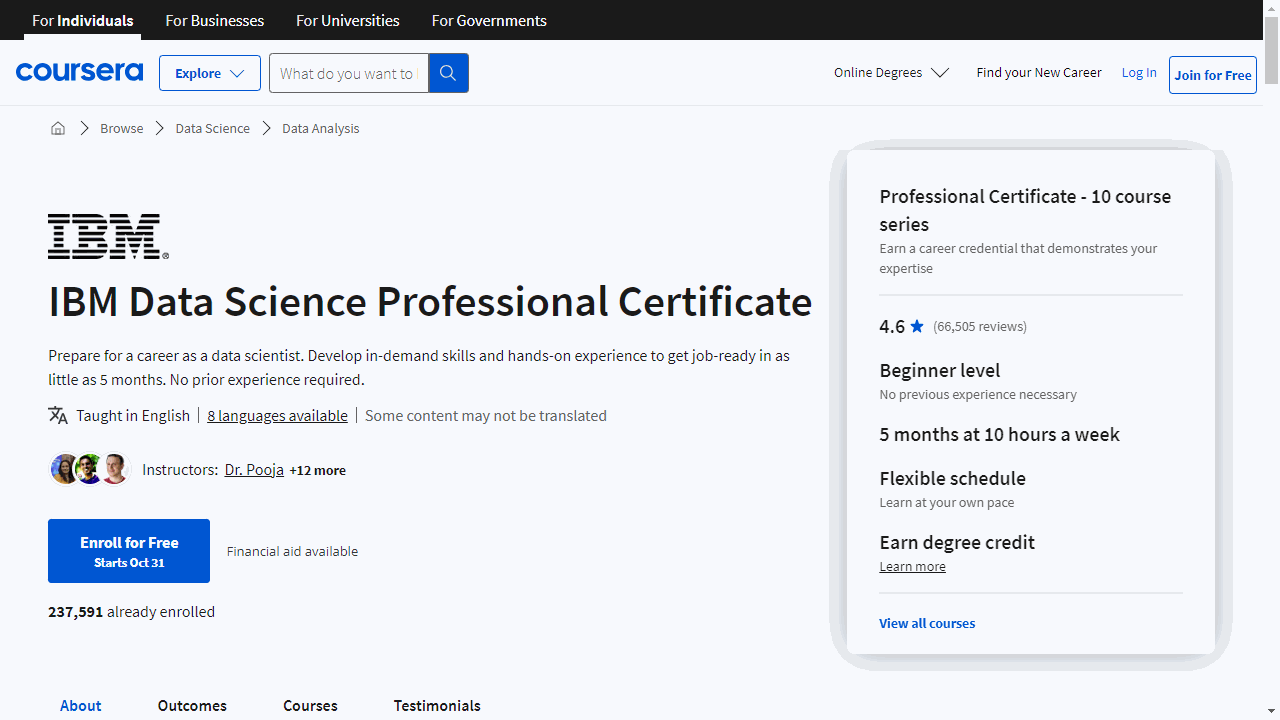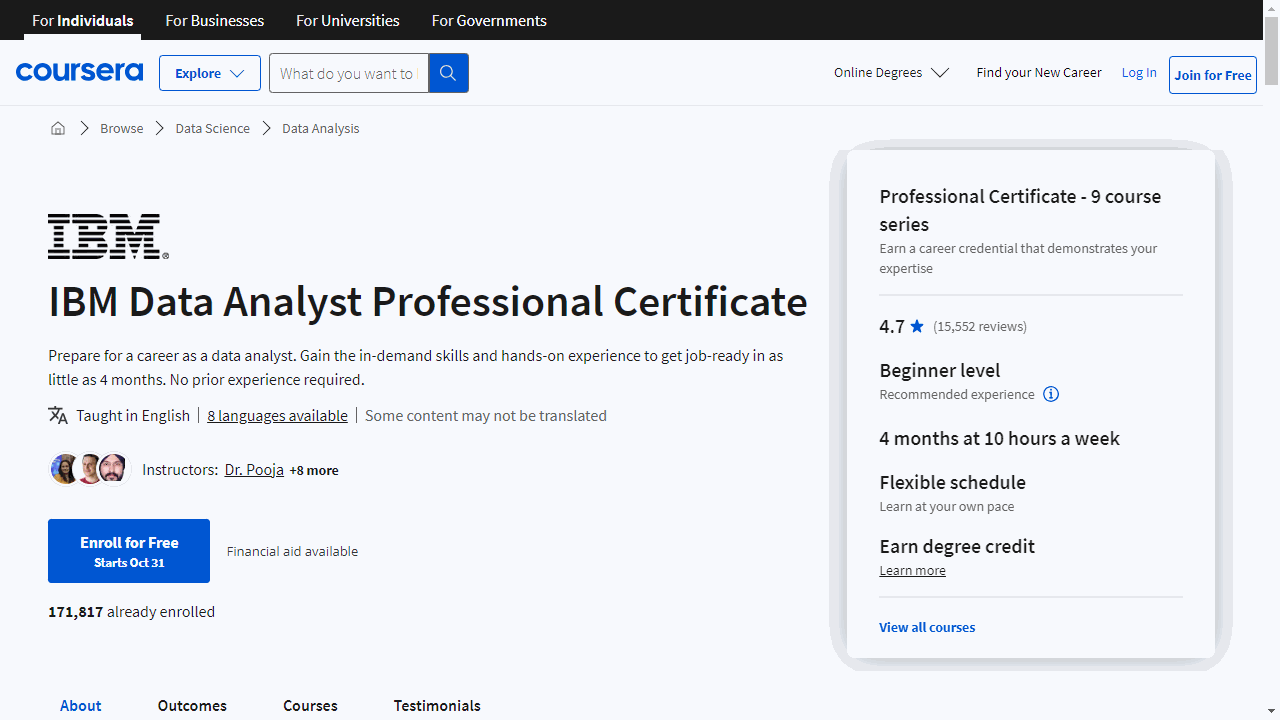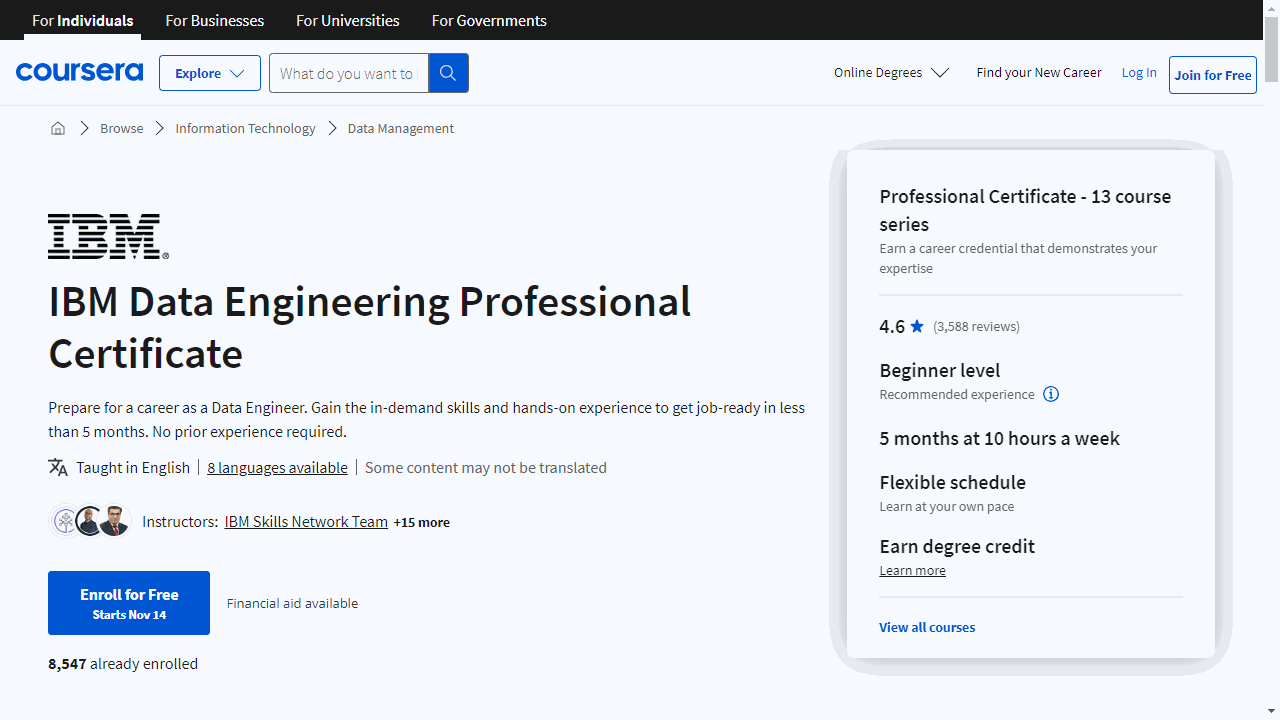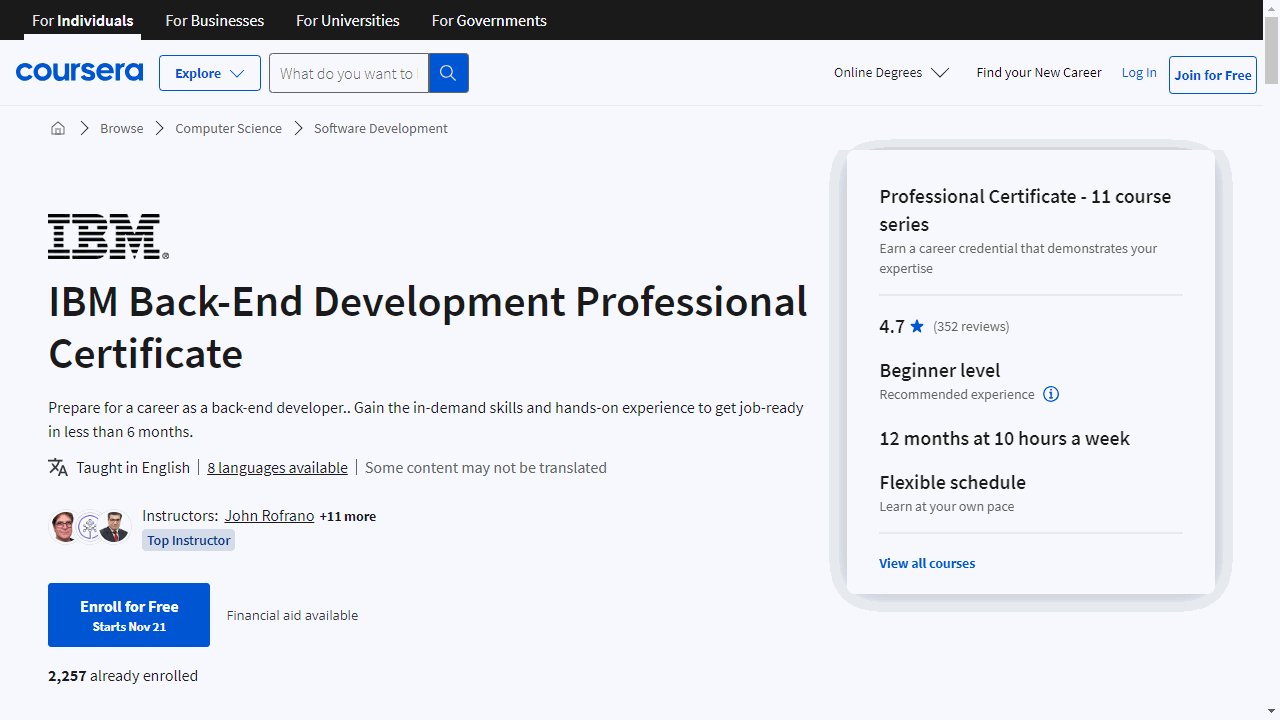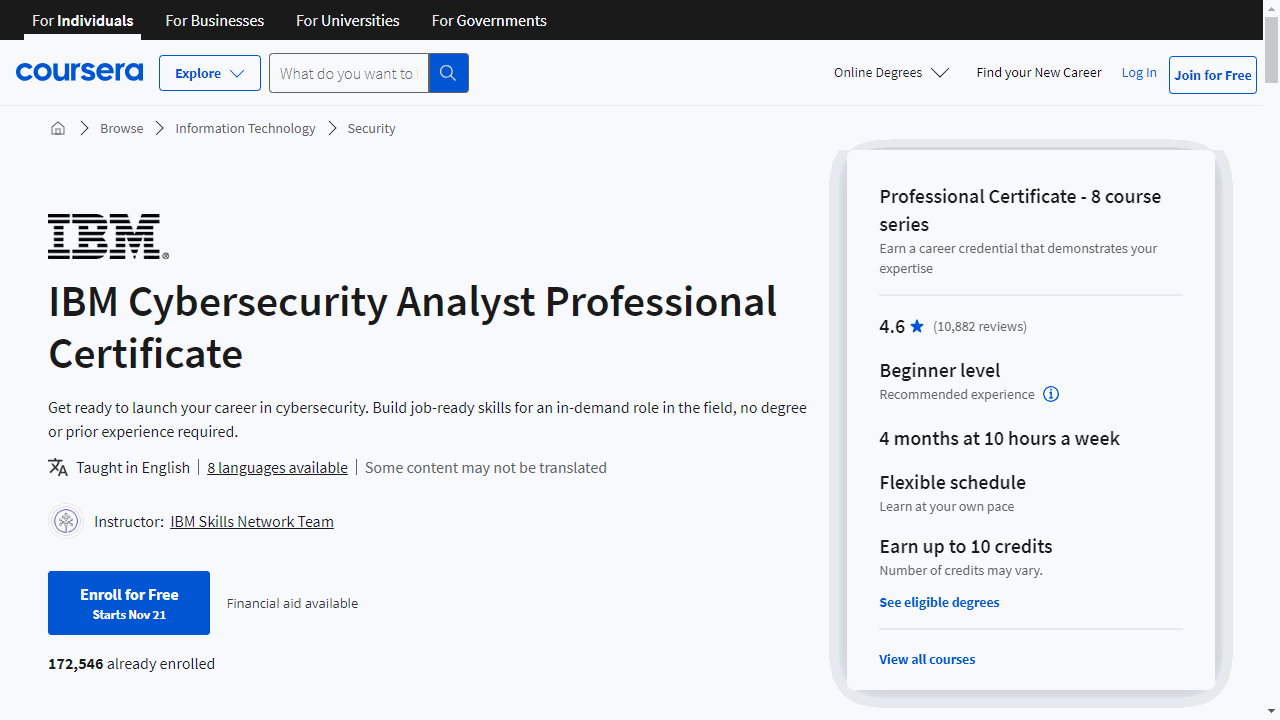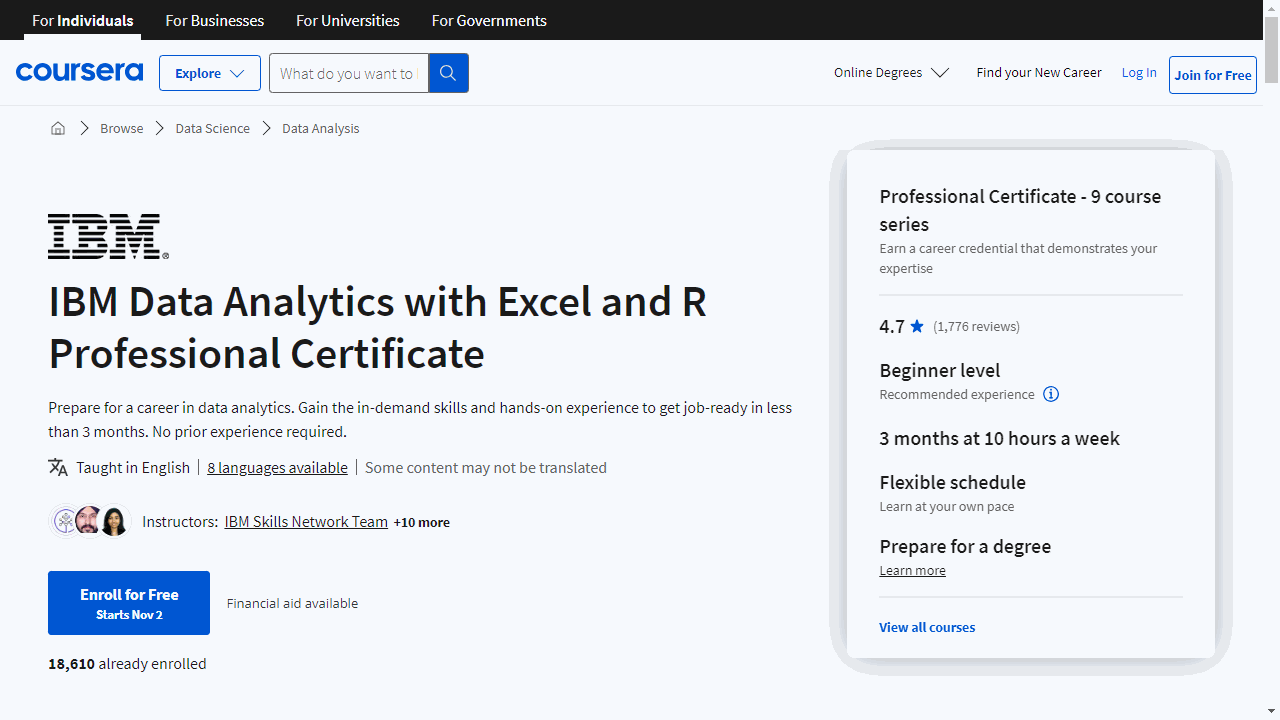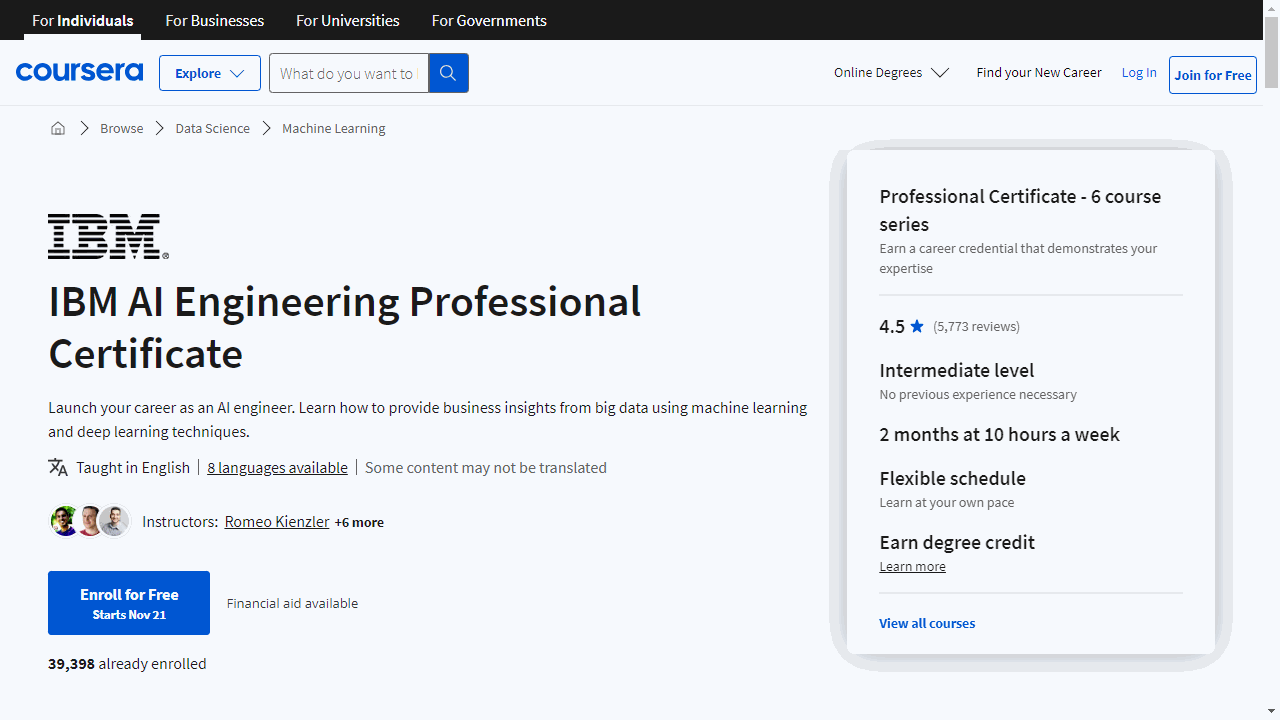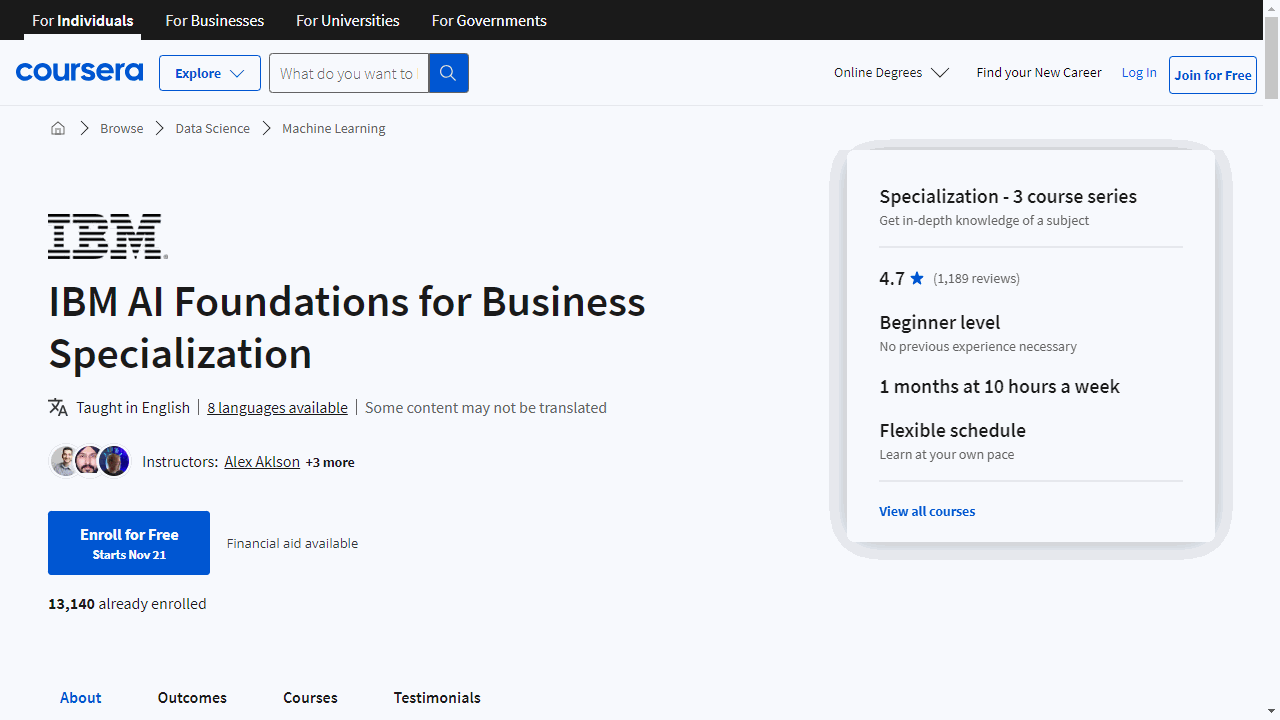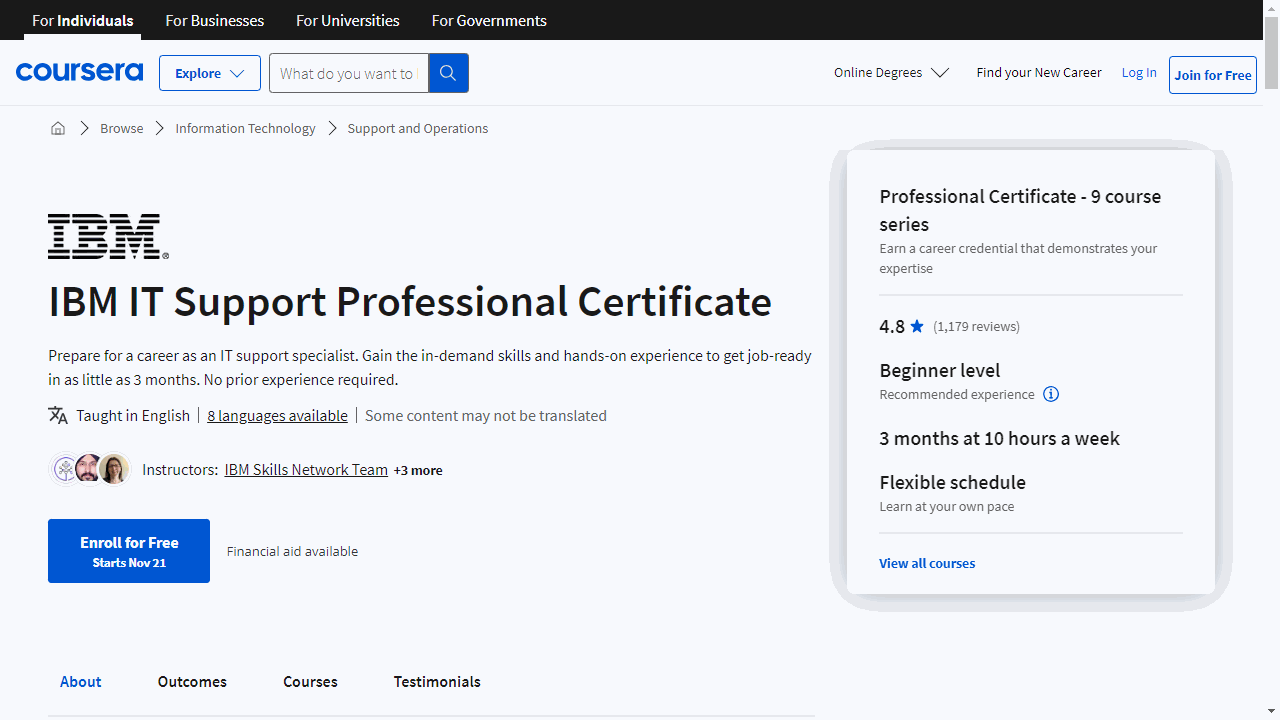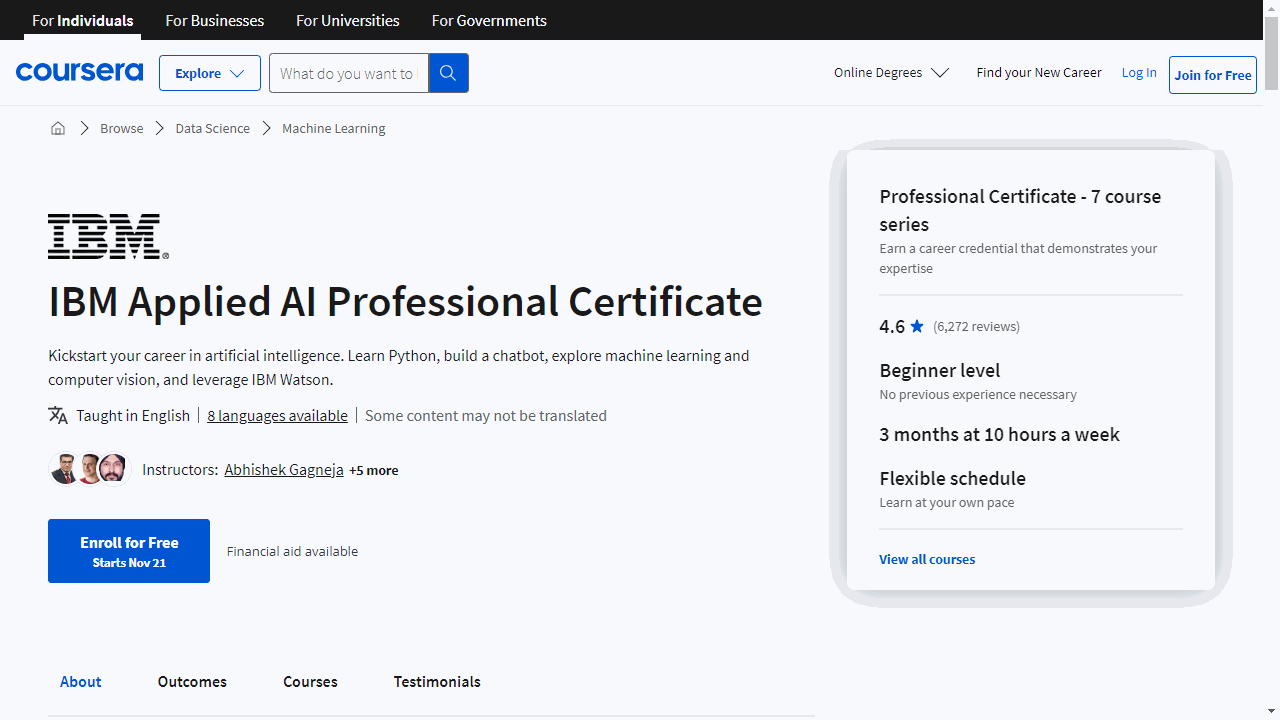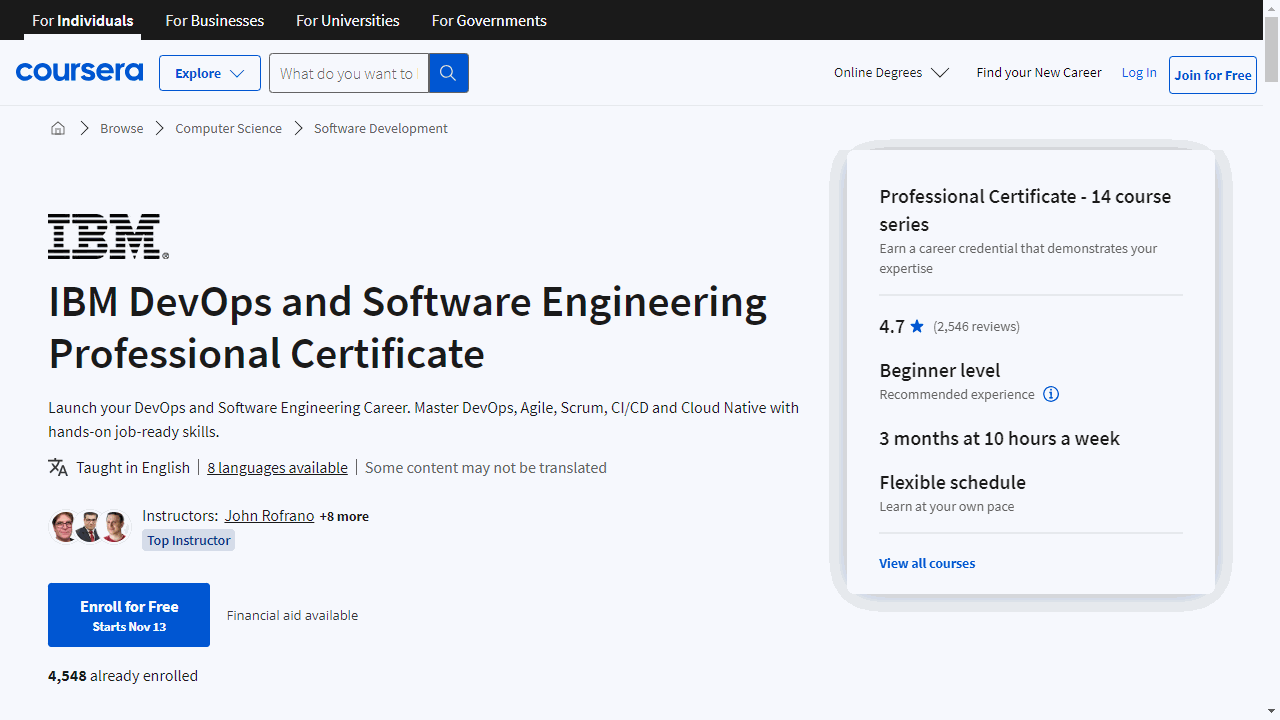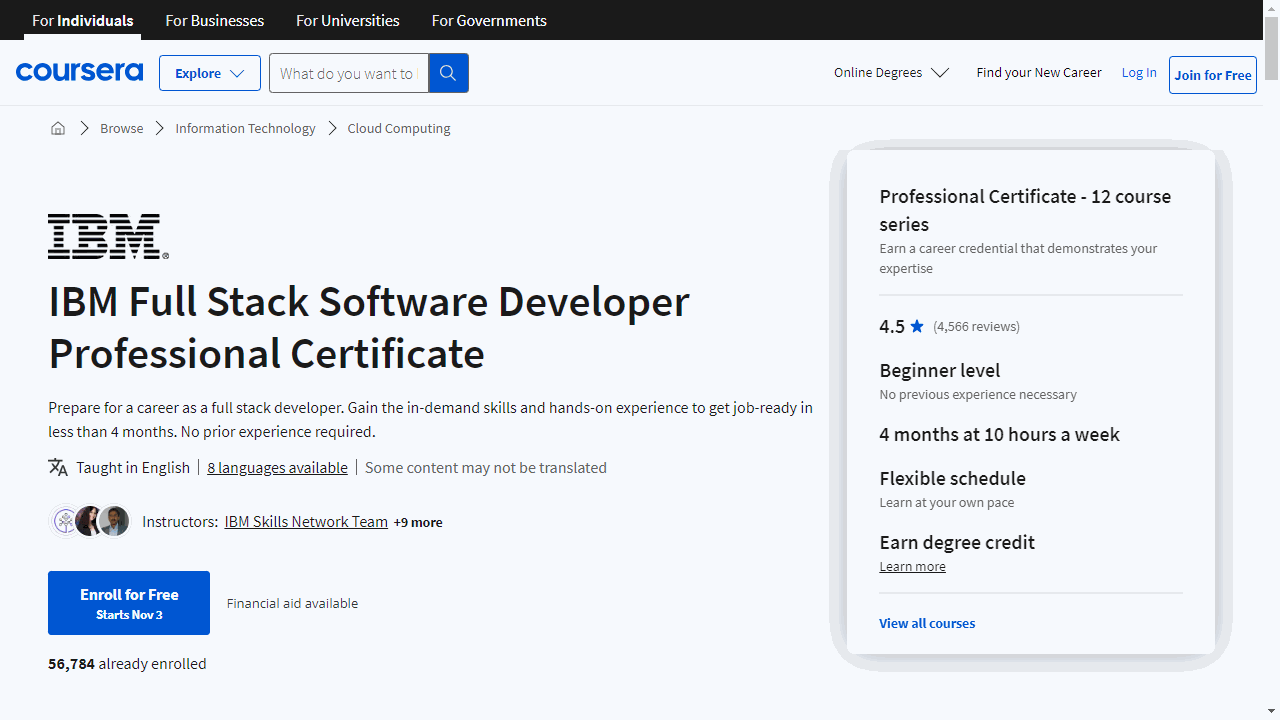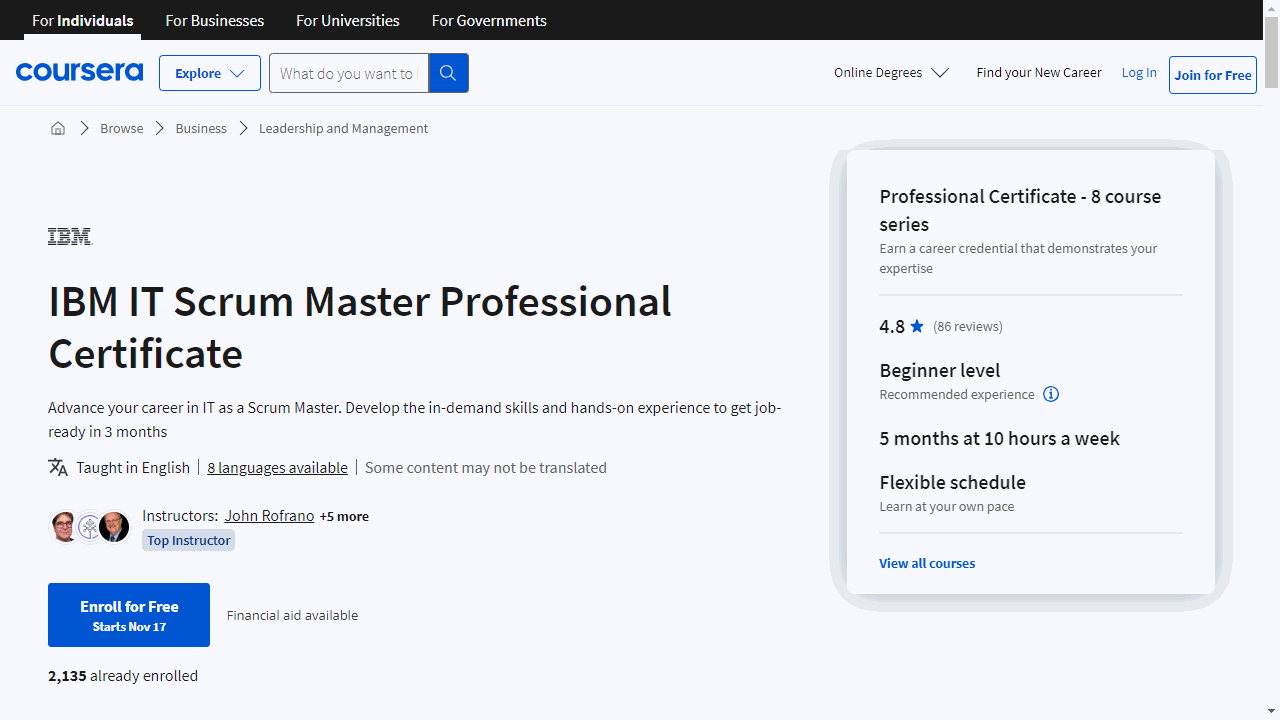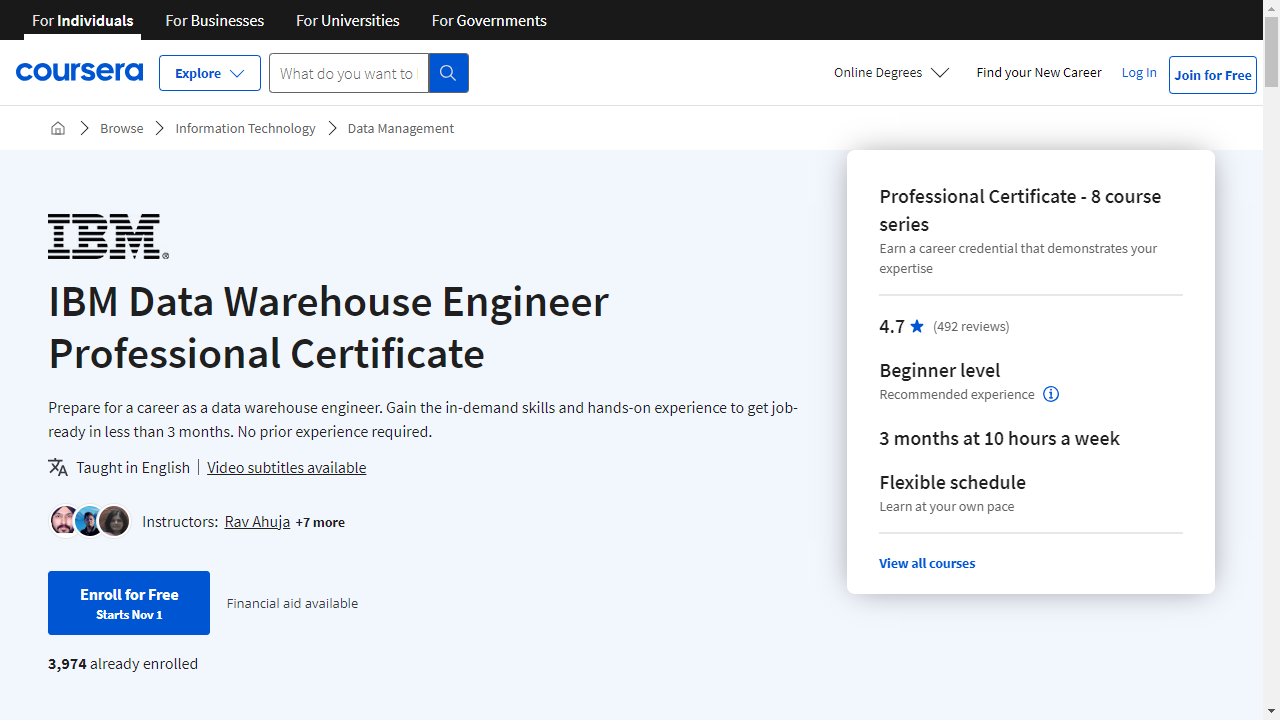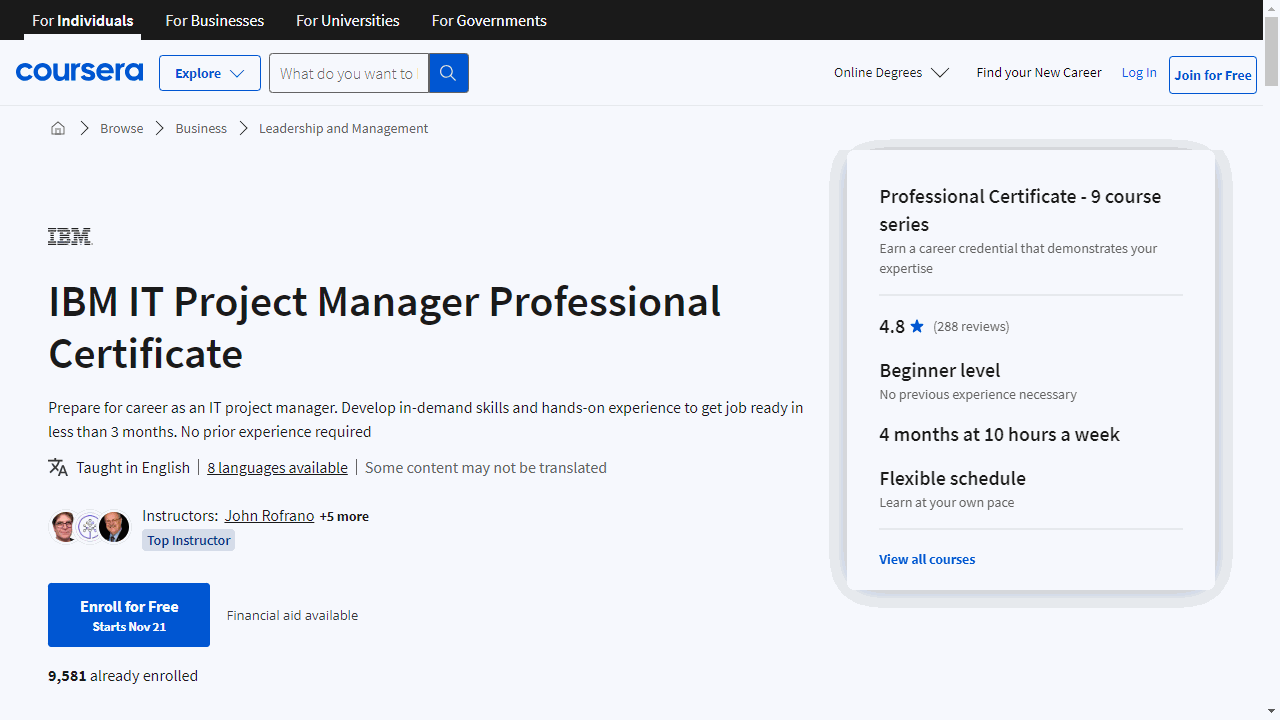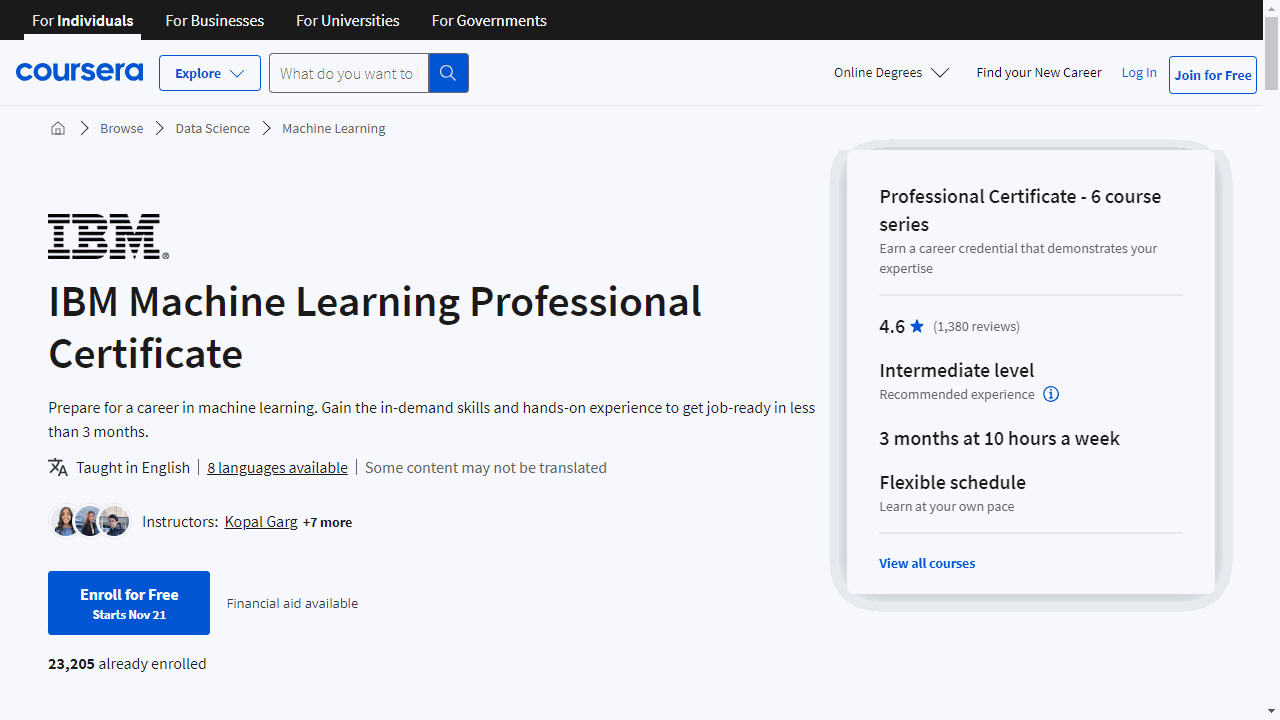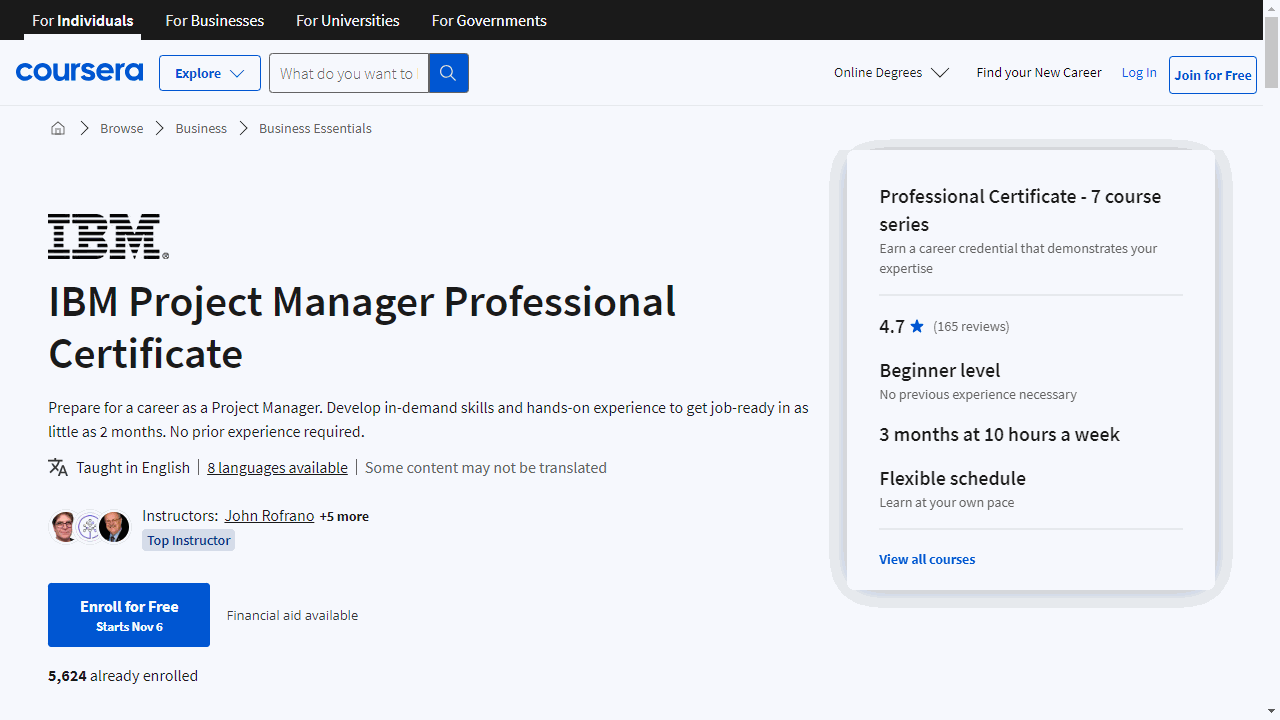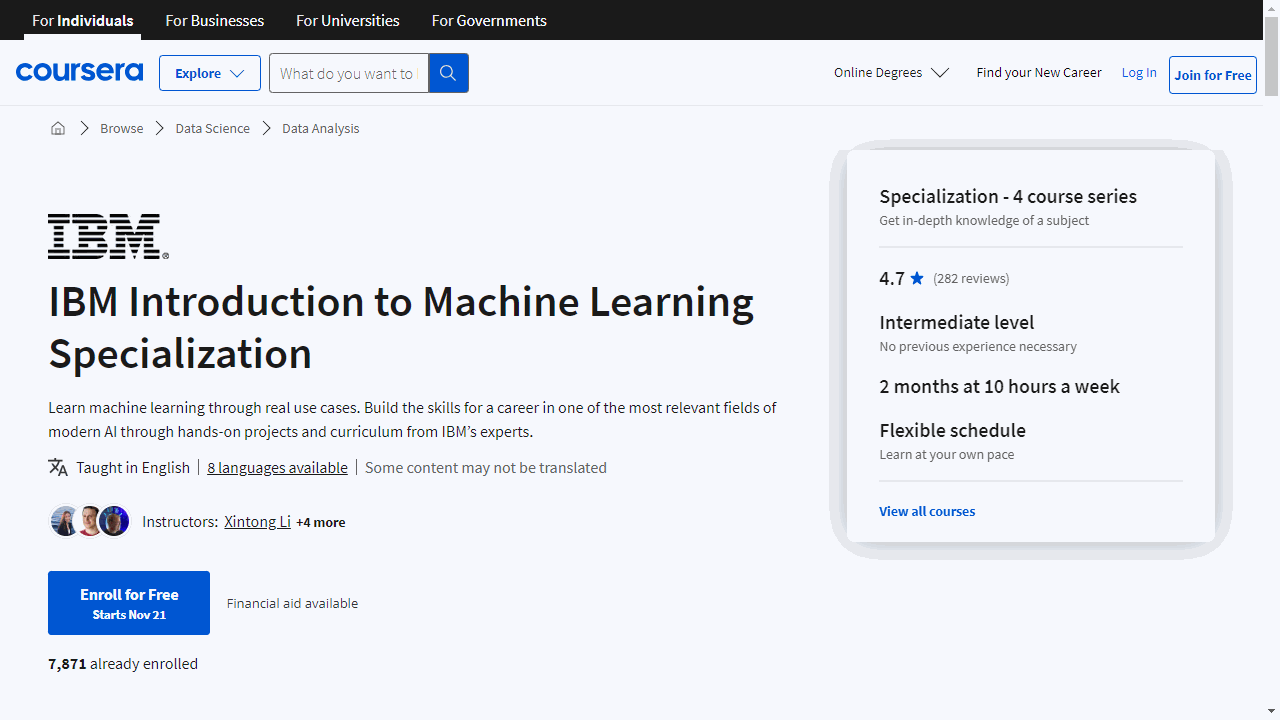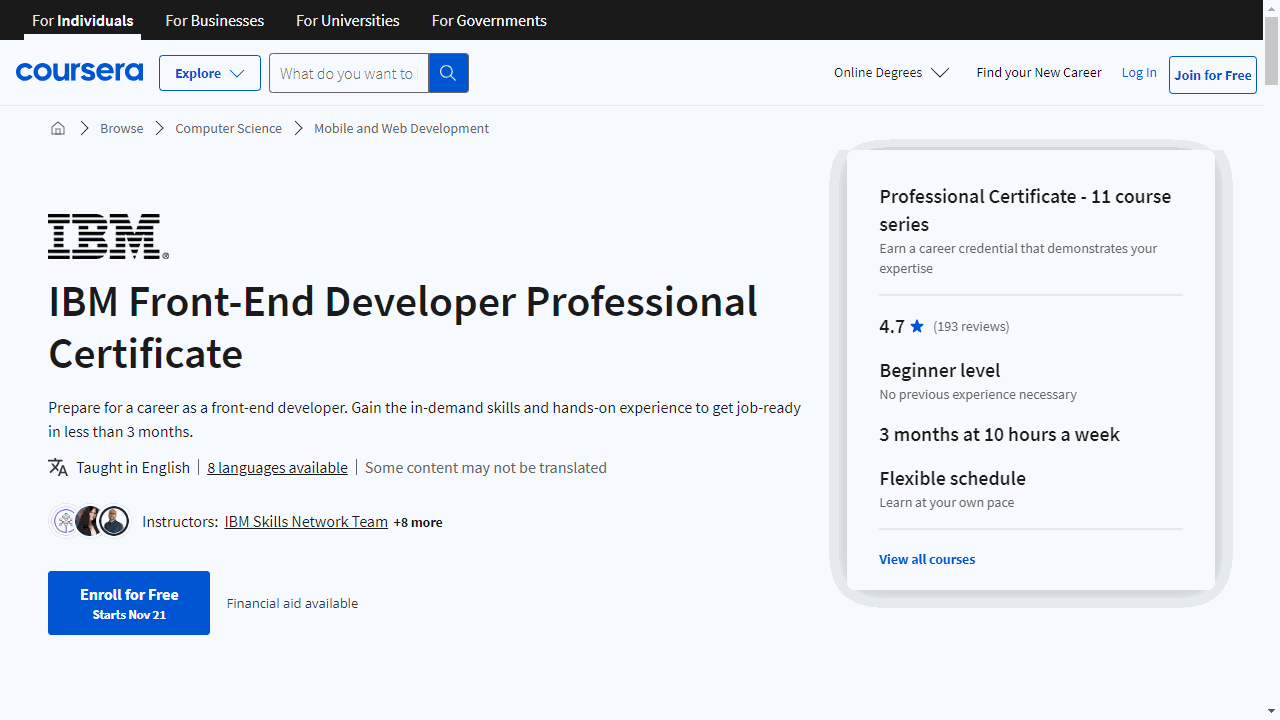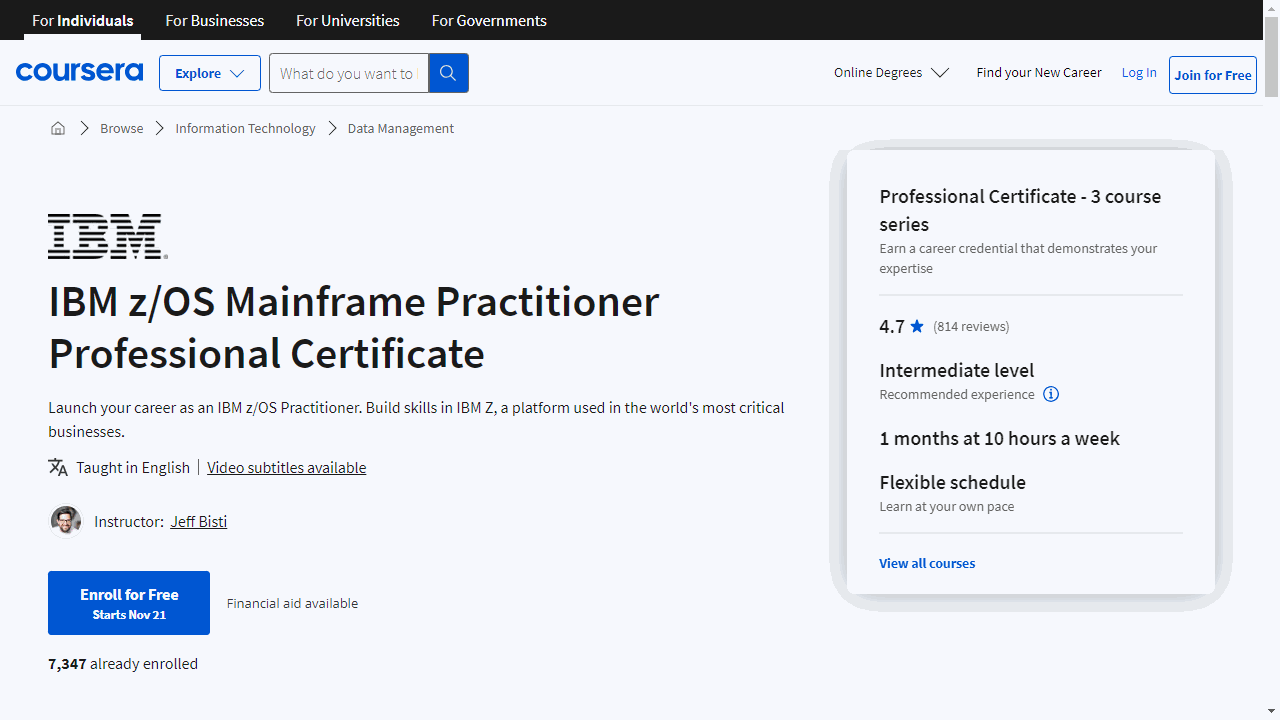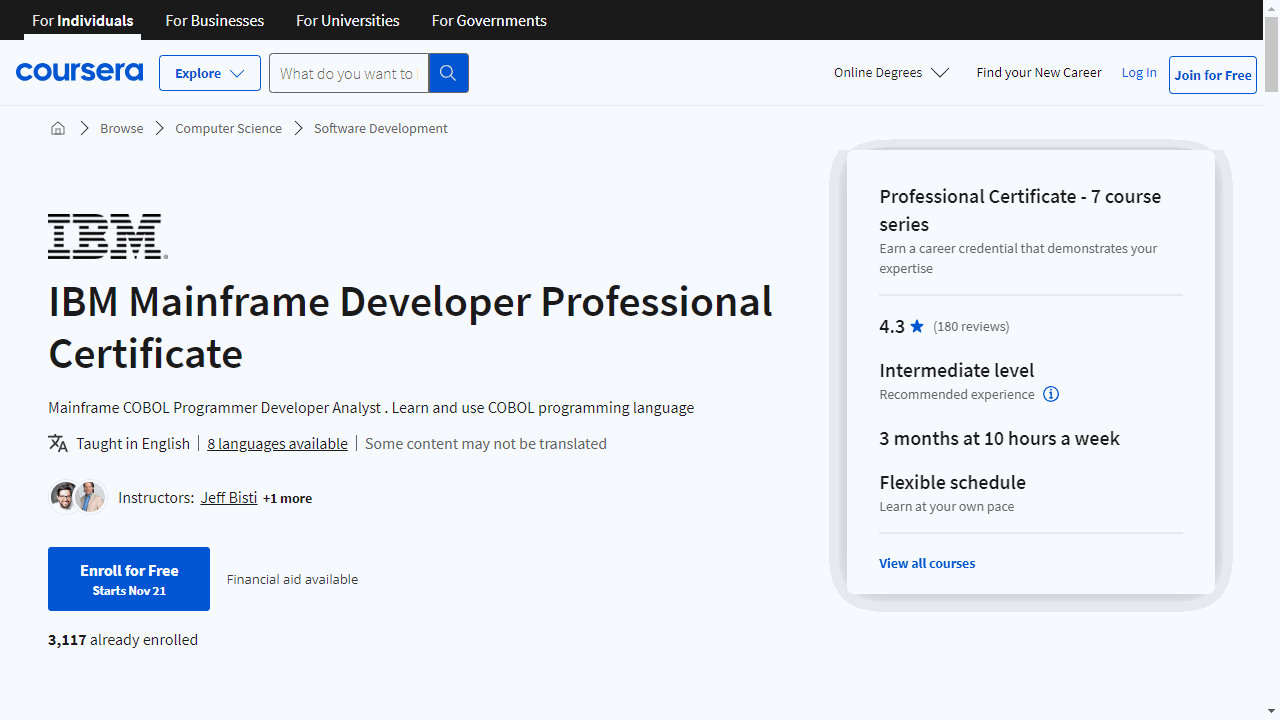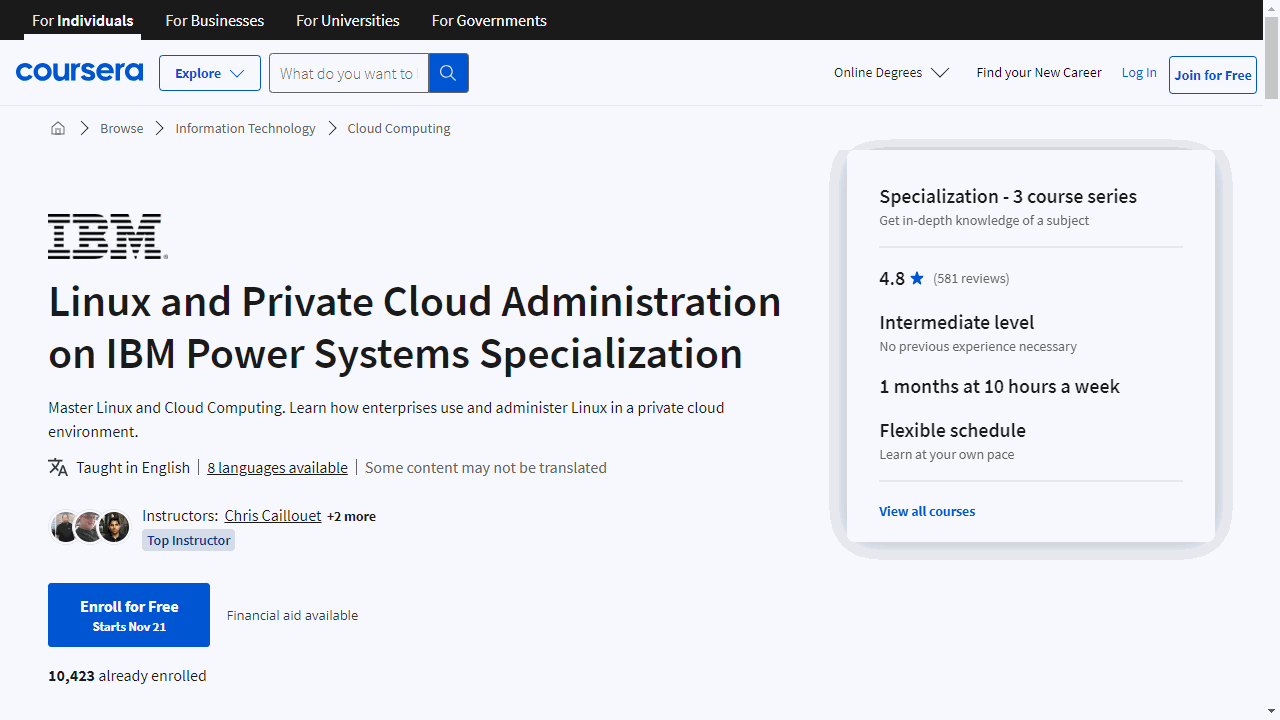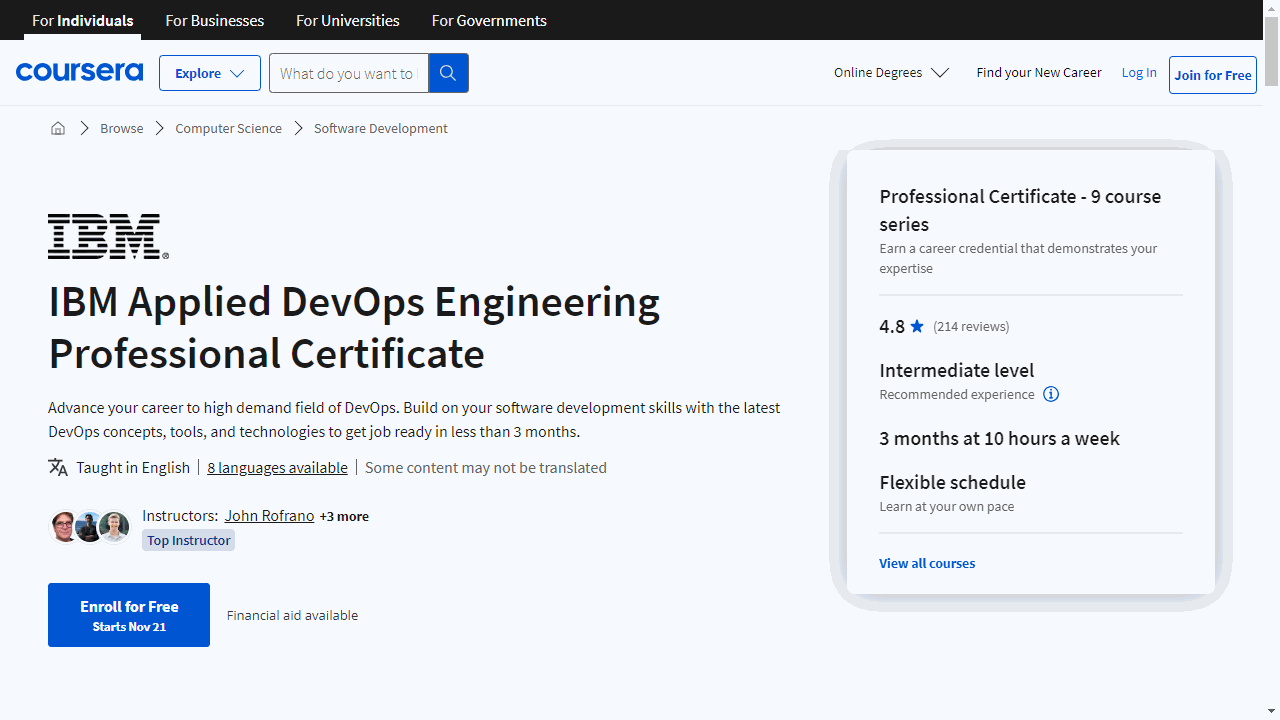Choosing the right IBM certification course can be overwhelming, with so many options available on Coursera.
It’s tough to find a course that’s both comprehensive and engaging, while also aligning with your specific career goals.
We’ve reviewed the best IBM certification courses on Coursera to make your choice easier.
For the best overall IBM certification course, we recommend IBM Data Science Professional Certificate.
This certificate program is highly rated for its comprehensive curriculum, hands-on projects, and industry-recognized credentials.
It covers a wide range of data science topics, from fundamental concepts to advanced techniques like machine learning.
You’ll gain practical experience through real-world projects and learn from expert instructors, preparing you for a successful career in data science.
Don’t worry if this isn’t quite what you’re looking for.
We have plenty of other IBM certification courses to choose from, including options for data analysts, cybersecurity professionals, cloud engineers, and more.
Keep reading for our detailed recommendations!
IBM Data Science Professional Certificate
The first course, “What is Data Science?” provides a solid foundation for understanding the field of data science.
It’s a great starting point for anyone interested in this field, offering insights into the work of data scientists and the importance of data science in today’s data-driven world.
The course has a high rating of 4.7, indicating that many learners found it valuable.
Next, “Tools for Data Science” introduces you to the essential tools used by data science professionals.
You’ll get hands-on experience with tools like Jupyter Notebooks, RStudio IDE, Git, GitHub, and Watson Studio.
This course is highly practical, allowing you to test each tool and run simple code in Python, R, or SQL.
The “Data Science Methodology” course teaches you how to think and work like a successful data scientist.
You’ll learn about the six-stage CRISP-DM data science methodology, which is widely used by professional data scientists.
“Python for Data Science, AI & Development” is a beginner-friendly course that takes you from zero to programming in Python in a matter of hours.
You’ll learn about Python basics, different data types, and how to use Python libraries such as Pandas, Numpy & Beautiful Soup.
The “Python Project for Data Science” is a mini-course designed to kickstart your portfolio by demonstrating your foundational Python skills for working with data.
You’ll work on a real-world data set and scenario to identify patterns and trends, showcasing your proficiency with Python and data science tools.
One skill that can never be overlooked in data science is SQL.
From the most senior machine learning engineers to the most junior data analysts, SQL is a skill that shows up in almost every data science job description.
“Databases and SQL for Data Science with Python” equips you with a working knowledge of SQL, a powerful language used for communicating with and extracting data from databases. You’ll learn SQL from the basics to advanced concepts like JOINs.
“Data Analysis with Python” takes you from the basics of data analysis with Python to building and evaluating data models.
You’ll learn how to import data from multiple sources, clean and wrangle data, perform exploratory data analysis (EDA), and create meaningful data visualizations.
“Data Visualization with Python” teaches you how to effectively visualize both small and large-scale data using the very popular Python libraries Matplotlib, Seaborn, and Folium.
You’ll learn to create various types of basic and advanced graphs and charts, and even interactive dashboards.
“Machine Learning with Python” dives into the world of Machine Learning (ML) using Python.
You’ll learn about different machine learning algorithms and get hands-on experience building, evaluating, and comparing several Machine Learning models using the popular Scikit-learn library.
Finally, the “Applied Data Science Capstone” is the final course in the IBM Data Science Professional Certificate.
This capstone project course gives you the chance to apply what you’ve learned in the previous courses to a real-world scenario.
IBM Data Analyst Professional Certificate
This comprehensive program offers a series of courses that cover everything from the basics of data analysis to advanced techniques and tools.
The first course, Introduction to Data Analytics, provides a solid foundation in the field, explaining the roles of data analysts, data scientists, and data engineers.
You’ll learn about the data ecosystem, including databases, data warehouses, and big data platforms.
By the end of the course, you’ll understand the fundamentals of the data analysis process, including gathering, cleaning, analyzing, and sharing data.
Next, the Excel Basics for Data Analysis course will give you a basic working knowledge of Excel and how to use it for analyzing data.
You’ll learn how to perform basic data wrangling and cleansing tasks using functions, and expand your knowledge of data analysis through the use of filtering, sorting, and pivot tables.
The Data Visualization and Dashboards with Excel and Cognos course will teach you how to create compelling data visualizations and dashboards.
You’ll learn how to use business intelligence (BI) tools like Cognos Analytics to create interactive dashboards.
This course is a great way to learn how to communicate your data analysis findings effectively.
The Python for Data Science, AI & Development course is a comprehensive introduction to Python, the most popular languages in the data science world.
You’ll learn about Python basics, data structures, and how to use Python libraries such as Pandas, Numpy & Beautiful Soup.
The Python Project for Data Science course is a mini-course designed to help you demonstrate your Python skills.
You’ll work on a real-world data set and scenario, performing tasks such as extracting data, web scraping, visualizing data, and creating a dashboard.
The Databases and SQL for Data Science with Python course is a must for any data professional.
You’ll learn SQL from the ground up, from basic SELECT statements to advanced concepts like JOINs.
The Data Analysis with Python course will take you from the basics of data analysis with Python to building and evaluating data models.
You’ll learn how to import data from multiple sources, clean and wrangle data, perform exploratory data analysis (EDA), and create meaningful data visualizations.
The Data Visualization with Python course will teach you many ways to effectively visualize both small and large-scale data.
You’ll learn to create various types of basic and advanced graphs and charts, and create interactive dashboards.
Finally, the IBM Data Analyst Capstone Project will allow you to apply everything you’ve learned in a real-world context.
You’ll perform various tasks that professional data analysts do as part of their jobs, including data collection, data wrangling, exploratory data analysis, statistical analysis, data visualization, and interactive dashboard creation.
IBM Data Engineering Professional Certificate
Begin with “Introduction to Data Engineering,” where you’ll familiarize yourself with the fundamentals of the field.
You’ll learn about data structures, file formats, and dive into the world of relational and NoSQL databases.
Understanding the data engineering lifecycle, including security and compliance, sets a strong base for your journey ahead.
“Python for Data Science, AI & Development” is where you’ll harness the power of Python, a critical tool in your data engineering toolkit.
You’ll start from the basics and quickly move to more complex concepts, using libraries that are staples in data manipulation and analysis.
This course ensures you’re well-prepared to handle real-world data tasks.
To solidify your Python skills, “Python Project for Data Engineering” offers a hands-on experience where you’ll apply your knowledge to practical data engineering problems.
Completing this project not only boosts your confidence but also enhances your portfolio, showcasing your ability to tackle data challenges head-on.
Databases are the cornerstone of data engineering, and “Introduction to Relational Databases (RDBMS)” provides a comprehensive look into their design and management.
You’ll get comfortable with SQL and database tools, setting you up to efficiently store and retrieve data.
Building on your database knowledge, “Databases and SQL for Data Science with Python” takes you deeper into SQL’s capabilities.
You’ll learn to craft sophisticated queries and work with data in more complex ways, integrating SQL with Python to elevate your data analysis skills.
The command line is an indispensable part of a data engineer’s arsenal, and “Hands-on Introduction to Linux Commands and Shell Scripting” equips you with the necessary command-line proficiency.
You’ll learn to navigate the Linux environment, automate tasks with shell scripting, and manage data processes effectively.
As you progress, “Relational Database Administration (DBA)” teaches you to maintain the health and performance of databases.
You’ll delve into optimization, security, and disaster recovery, ensuring data integrity and availability.
For a contemporary approach, “ETL and Data Pipelines with Shell, Airflow and Kafka” introduces you to modern data pipeline construction.
You’ll explore the nuances of data processing and learn to use cutting-edge tools to build scalable and efficient data pipelines.
In “Getting Started with Data Warehousing and BI Analytics,” you’ll bridge the gap between data storage and business decision-making.
This course covers the design and use of data warehouses and BI tools, enabling you to transform data into actionable insights.
The “Introduction to NoSQL Databases” course broadens your database knowledge by diving into the world of NoSQL.
You’ll explore different NoSQL database types and gain practical experience in managing large, unstructured datasets.
For those interested in big data, “Introduction to Big Data with Spark and Hadoop” is an essential course.
You’ll learn how to process vast amounts of data using distributed computing, preparing you for the challenges of big data analytics.
“Machine Learning with Apache Spark” is where data engineering meets machine learning.
You’ll explore the creation of ML models and discover how to integrate them into data pipelines, a skill that’s increasingly valuable in today’s data-driven world.
Finally, the “Data Engineering Capstone Project” is your opportunity to bring all your newly acquired skills to bear on a real-world scenario.
This project simulates the experience of a data engineer, challenging you to design and implement a comprehensive data analytics platform.
IBM Back-End Development Professional Certificate
The IBM Back-End Development Professional Certificate on Coursera is a comprehensive program that could be the stepping stone you need to launch a career in software development.
The program kicks off with “Introduction to Software Engineering,” laying a solid groundwork in software development and programming.
You’ll delve into the Software Development Lifecycle (SDLC) and get acquainted with Agile and Scrum frameworks.
The course is hands-on, offering labs where you’ll practice with an IDE and start coding in Python, setting you up for a versatile career in tech.
Moving on, “Hands-on Introduction to Linux Commands and Shell Scripting” demystifies the Linux operating system.
You’ll learn to navigate, execute commands, and automate tasks with shell scripting.
The course provides a virtual Linux server for practice, ensuring you can apply your learning without any hassle.
For those looking to collaborate on code, “Getting Started with Git and GitHub” is invaluable.
It covers the essentials of version control, teaching you to manage and contribute to projects with Git and GitHub.
By the end, you’ll have the confidence to collaborate on software projects and contribute to open-source communities.
Data science enthusiasts will find “Python for Data Science, AI & Development” particularly engaging.
This course introduces Python programming, one of the most sought-after skills in the industry.
You’ll work with data structures and libraries, such as Pandas and Numpy, and learn to manipulate data and automate tasks.
In “Developing AI Applications with Python and Flask,” you’ll apply your Python skills to the realm of AI.
Using IBM Watson AI libraries and the Flask framework, you’ll create intelligent web applications, a skill that’s increasingly important as AI integration becomes the norm in software development.
“Django Application Development with SQL and Databases” focuses on database interaction—a critical skill for any developer.
You’ll learn SQL and how to use Django’s ORM to build dynamic web applications.
The course also covers deploying these applications to the cloud, a skill that’s essential in today’s cloud-centric job market.
Containerization is a buzzword for good reason, and “Introduction to Containers w/ Docker, Kubernetes & OpenShift” will show you why.
You’ll learn to package and deploy applications seamlessly across different environments, a skill that’s revolutionizing how software is developed and deployed.
The “Application Development using Microservices and Serverless” course introduces you to cutting-edge architecture and deployment models.
You’ll build microservices and learn about serverless computing, preparing you to work on modern, scalable applications.
Security is paramount, and “Application Security for Developers and DevOps Professionals” ensures you’re up to speed.
You’ll explore secure coding practices and learn to protect applications from common security threats, an indispensable skill in protecting company and customer data.
“Monitoring and Observability for Development and DevOps” teaches you to keep your applications performing optimally.
You’ll get to grips with tools and practices that help you monitor and troubleshoot applications, ensuring they run efficiently and reliably.
Finally, the “Back-end Application Development Capstone Project” allows you to apply everything you’ve learned.
You’ll take on the role of a developer, building and deploying a multi-service application, showcasing your skills to potential employers.
IBM Cybersecurity Analyst Professional Certificate
Begin with “Introduction to Cybersecurity Tools & Cyber Attacks,” where you’ll grasp the evolution of cyber threats and familiarize yourself with fundamental security concepts and tools.
This course lays the groundwork for understanding the complexities of protecting digital assets.
Progress to “Cybersecurity Roles, Processes & Operating System Security,” which delves into the human aspect of cybersecurity.
You’ll explore various roles and their responsibilities, and gain practical knowledge of operating system commands.
Understanding virtualization’s impact on security is another key takeaway.
The “Cybersecurity Compliance Framework & System Administration” course is pivotal for those looking to navigate the maze of industry standards and compliance requirements.
It also covers the nuts and bolts of user and server administration, emphasizing the importance of endpoint security and the intricacies of cryptography.
Network security is the focus of the “Network Security & Database Vulnerabilities” course.
Here, you’ll dive into the technicalities of network infrastructure and learn how to identify and mitigate database vulnerabilities—a critical skill for safeguarding an organization’s data.
“Penetration Testing, Incident Response and Forensics” offers a hands-on approach to proactive security measures and reactive strategies.
You’ll explore the tools and techniques for penetration testing, learn to craft effective incident response plans, and understand the meticulous process of digital forensics.
In “Cyber Threat Intelligence,” the curriculum shifts to defensive strategies and the importance of threat intelligence.
You’ll learn to use tools for network monitoring and data protection, ensuring you’re well-versed in the latest defensive tactics.
The program culminates with the “Cybersecurity Capstone: Breach Response Case Studies,” where you apply your cumulative knowledge to real-world scenarios.
This practical exercise simulates the decision-making process in the aftermath of a cyber breach, preparing you for real-life challenges.
Completing the series with the “IBM Cybersecurity Analyst Assessment” solidifies your understanding and earns you the IBM Cybersecurity Analyst Professional Certificate, a testament to your readiness for a role in the field.
IBM Data Analytics with Excel and R Professional Certificate
This professional certificate gives you a gentle introduction to data analysis and the key steps like gathering, cleaning, analyzing, and visualizing data.
Through a series of hands-on courses, you’ll gain in-demand skills in Excel, SQL, data visualization, dashboard creation, R programming, and more.
No coding experience required! The focus is on practical application, so you’ll complete projects and build a portfolio to showcase your abilities.
Starting from square one, you’ll get a gentle introduction to data analytics concepts.
What does a data analyst do day-to-day? How is their role different from a data scientist or engineer? This background will ensure you have the right expectations from the start.
Up next is Excel training. Excel is an essential data analytics tool that you’ll use to import, clean, analyze, and visualize data.
Easy to learn and user-friendly, Excel will become your new best friend!
With guided practice, you’ll quickly become proficient at all the most important data wrangling and analysis features.
Then comes the fun part: visualizations and dashboards!
You’ll learn to create striking charts, graphs, and maps to bring data insights to life. Using Cognos Analytics, you’ll even build interactive dashboards to impress colleagues and clients.
While Excel can take you far, real data analysts need to know R.
This powerful, open-source programming language was created for statistical analysis and is in high demand.
No worries if you’ve never coded before - you’ll learn R from square one. With hands-on practice, you’ll master the must-have skills like building data frames, functions, and pipelines.
By the end, you’ll conduct your own complete data analysis project and create a presentation to share your data-driven insights.
With IBM’s Professional Certificate on your resume, you’ll have the real-world skills to excel as a data analyst or continue your education in this fast-growing, lucrative field.
IBM AI Engineering Professional Certificate
Embarking on a journey through the IBM AI Engineering Professional Certificate on Coursera can be a transformative step in your career, whether you’re just starting out or looking to deepen your expertise in AI and Machine Learning.
The course “Machine Learning with Python” is an excellent starting point.
It eases you into the complex world of Machine Learning, covering essential concepts and algorithms.
You’ll gain practical experience with Python’s powerful libraries, such as SciPy and scikit-learn, and by the end of the course, you’ll be adept at building and evaluating diverse Machine Learning models.
Moving on, “Introduction to Deep Learning & Neural Networks with Keras” demystifies deep learning.
It’s a course that clarifies the nuances between traditional neural networks and their deep learning counterparts.
Through hands-on exercises, you’ll learn to construct deep learning models using Keras, gaining insights into both supervised and unsupervised deep learning models.
For those intrigued by how AI can interpret images, “Introduction to Computer Vision and Image Processing” offers a practical introduction.
You’ll explore the applications of computer vision and learn to manipulate images using Python, Pillow, and OpenCV.
The course culminates in a project where you’ll build a computer vision web app, providing a real-world application of your skills.
“Deep Neural Networks with PyTorch” delves into the PyTorch library, a favorite among researchers for its flexibility and ease of use.
Starting with the basics, the course guides you through the creation of advanced models, including the implementation of various activation functions, normalization, and dropout layers.
By the end, you’ll be proficient in building deep neural networks with PyTorch.
In “Building Deep Learning Models with TensorFlow,” you’ll explore TensorFlow’s capabilities in handling unstructured data.
The course covers a range of deep architectures and teaches you how TensorFlow can be applied to solve complex problems through deep learning, providing a solid foundation for further exploration and innovation.
The “AI Capstone Project with Deep Learning” is where you’ll apply everything you’ve learned to a real-world problem.
This project-based course allows you to select a library and develop a deep learning model, offering a chance to demonstrate your ability to handle a complete deep learning pipeline from data preprocessing to model validation.
IBM AI Foundations for Business Specialization
The specialization kicks off with “Introduction to Artificial Intelligence (AI),” a course that demystifies AI for learners of all backgrounds.
You’ll delve into the essence of AI, its transformative role in various industries, and the foundational concepts such as machine learning and neural networks.
The course also addresses the societal impacts of AI, including ethical considerations and the future job landscape.
The highlight? A mini project that allows you to apply what you’ve learned in a practical setting.
Moving on to “What is Data Science?” you’ll discover the reasons behind data science’s growing reputation.
This course breaks down the role of data scientists and the significance of their work in extracting meaningful insights from data.
It’s an exploration of the analytical skills that power predictions and strategic decisions in business.
Insights from seasoned professionals provide a window into the real world of data science, offering guidance for aspiring data scientists.
Finally, “The AI Ladder: A Framework for Deploying AI in your Enterprise” is designed for those looking to integrate AI into their business strategy.
This course introduces the AI Ladder, a strategic framework for implementing AI solutions effectively.
It’s an essential guide for anyone involved in the decision-making process of AI adoption, providing clarity on the necessary steps for successful integration.
Each course within this specialization is crafted to provide actionable knowledge and insights, preparing you to navigate and leverage AI and data science in practical scenarios.
IBM IT Support Professional Certificate
The journey begins with “Introduction to Technical Support,” where you’ll grasp the essentials of IT support roles and responsibilities.
This course demystifies the field, offering insights from experts and introducing you to the tools of the trade, such as ticketing systems.
It’s a practical first step, providing a clear understanding of the support landscape.
Moving on to “Introduction to Hardware and Operating Systems,” you’ll delve into the physical components that power technology.
This course lays a foundation for recognizing and troubleshooting hardware issues, a critical skill for any IT professional.
It’s also a gateway to further certification, aligning with CompTIA exam objectives.
Software is at the heart of IT, and “Introduction to Software, Programming, and Databases” covers the basics.
From cloud computing to programming with Python, this course broadens your software knowledge and includes interactive exercises to reinforce learning.
Networks are crucial to IT infrastructure, and “Introduction to Networking and Storage” ensures you’re well-versed in setting up and maintaining these systems.
You’ll learn about different storage options and how to troubleshoot common network issues, a skill set that’s in high demand.
With cyber threats increasingly prevalent, “Introduction to Cybersecurity Essentials” is timely and relevant.
This course equips you with the knowledge to safeguard information and understand common cyber-attacks, preparing you for roles that prioritize security.
Cloud computing is reshaping the IT landscape, and “Introduction to Cloud Computing” provides a comprehensive overview of this field.
You’ll explore various cloud service models and gain hands-on experience by deploying an application, a valuable skill for modern IT roles.
For those targeting CompTIA certifications, “Practice Exam for CompTIA ITF+ Certification” is an invaluable resource.
This course offers a simulated exam experience, helping you gauge your readiness and identify areas for improvement.
The “Technical Support (IT) Case Studies and Capstone” course is where theory meets practice.
You’ll tackle real-world technical support scenarios, honing your problem-solving skills and preparing you for the challenges of an IT support role.
Finally, “Tech Support Career Guide and Interview Preparation” provides guidance on entering the job market.
From crafting a compelling resume to acing interviews, this course offers practical advice to enhance your job prospects.
IBM Applied AI Professional Certificate
Embarking on the IBM Applied AI Professional Certificate through Coursera is a strategic move if you are curious about the burgeoning field of Artificial Intelligence.
This suite of courses is meticulously designed to cater to learners from all walks of life, regardless of their technical expertise.
The journey begins with “Introduction to Artificial Intelligence (AI),” a course that demystifies AI for the uninitiated.
It’s an accessible entry point that doesn’t demand a background in programming or computer science.
You’ll come to understand AI’s transformative impact on society, grasp foundational concepts like machine learning, and consider the ethical implications of this powerful technology.
For those intrigued by the creative potential of AI, “Generative AI: Introduction and Applications” offers a deep dive into the world of content creation through AI.
You’ll explore the capabilities of groundbreaking models and tools, such as GPT and DALL-E, and understand their practical applications across various domains.
The course includes hands-on labs, allowing you to experiment with IBM’s Generative AI Classroom and familiarize yourself with generative models.
Delving further into the nuances of AI, “Generative AI: Prompt Engineering Basics” teaches you the art of prompt engineering.
This skill is crucial for steering generative AI models to produce targeted outcomes.
Through this course, you’ll learn to craft effective prompts and utilize IBM’s prompt engineering tools, enhancing the precision and relevance of AI-generated content.
If coding isn’t your forte, “Building AI Powered Chatbots Without Programming” is an ideal pick.
This course empowers you to create engaging chatbots using IBM Watson’s Natural Language Processing capabilities, all without writing a single line of code.
You’ll learn to deploy these chatbots on a website, ensuring they provide value and enhance user experience.
If you are ready to tackle programming, “Python for Data Science, AI & Development” is a comprehensive introduction to one of the most sought-after programming languages in the industry.
You’ll start from the basics and quickly progress to using Python for data manipulation and web scraping, building a solid foundation for further exploration in data science and AI.
Putting your Python skills to practical use, “Developing AI Applications with Python and Flask” guides you through creating AI-enabled web applications.
This project-based course reinforces your understanding of Python and introduces Flask, a micro web framework, as you develop and deploy an AI application.
Lastly, “Building AI Applications with Watson APIs” rounds out the certificate by teaching you to integrate multiple Watson AI services.
You’ll gain insights into best practices for creating sophisticated AI applications that can interact with users through text and voice, preparing you to build systems that can be deployed across various platforms.
Each course in the IBM Applied AI Professional Certificate is a stepping stone towards fluency in AI.
You’ll gain practical skills, work on projects that bolster your portfolio, and learn from one of the leading names in technology.
This certificate is more than just a learning experience—it’s an investment in your future in the AI landscape.
IBM DevOps and Software Engineering Professional Certificate
This program is tailored to provide a well-rounded education, from the fundamentals of DevOps to the intricacies of cloud computing and beyond.
The “Introduction to DevOps” course is where you’ll start, gaining insight into the collaborative culture that drives high-performing teams.
You’ll explore essential practices like CI/CD and get a taste of cloud native architecture, setting a strong foundation for building robust applications.
Cloud computing is no longer just a buzzword, and the “Introduction to Cloud Computing” course ensures you understand why.
It covers everything from service models to the architecture of the cloud, preparing you to deploy applications with confidence.
The hands-on project at the end is a practical way to apply what you’ve learned.
Agile and Scrum methodologies are at the heart of modern software development, and “Introduction to Agile Development and Scrum” will help you master these approaches.
You’ll learn to plan sprints, manage backlogs, and improve team efficiency, all while fostering a collaborative environment.
If you enjoy the technical side, “Hands-on Introduction to Linux Commands and Shell Scripting” offers a deep dive into the Linux operating system.
You’ll learn to navigate the terminal and write scripts that automate tasks, skills that are invaluable in today’s tech landscape.
Version control is essential, and “Getting Started with Git and GitHub” demystifies this process.
You’ll learn how to manage code changes and collaborate effectively using GitHub, a skill that’s critical for any software engineering role.
Python is a versatile language, and “Python for Data Science, AI & Development” introduces you to its potential. Whether you’re interested in data analysis, AI, or general development, this course provides the tools to start coding with Python.
The “Developing AI Applications with Python and Flask” course allows you to apply your Python skills to the exciting world of AI.
You’ll build web applications using Flask and integrate AI features, preparing you for the future of software development.
Containerization is changing the deployment landscape, and “Introduction to Containers w/ Docker, Kubernetes & OpenShift” ensures you’re up to speed.
You’ll learn how to use these tools to create flexible, scalable applications—a skill that’s increasingly important in the industry.
Microservices and serverless architectures are modern approaches to building applications, and “Application Development using Microservices and Serverless” guides you through these concepts.
You’ll learn to develop and deploy applications in a way that’s both efficient and scalable.
Testing is crucial, and “Introduction to Test and Behavior Driven Development” focuses on ensuring your code works as intended.
You’ll practice writing tests that keep your development process on track and your end product reliable.
Automation is a key component of DevOps, and “Continuous Integration and Continuous Delivery (CI/CD)” teaches you how to streamline the software delivery process.
You’ll explore tools and practices that make releasing software faster and more reliable.
Security is non-negotiable, and “Application Security for Developers and DevOps Professionals” equips you with the knowledge to safeguard your applications.
You’ll delve into security best practices and learn how to integrate security measures throughout the development lifecycle.
Lastly, “Monitoring and Observability for Development and DevOps” teaches you how to keep your applications running smoothly.
You’ll get hands-on with monitoring tools and learn the principles of observability, ensuring you can maintain and improve your systems effectively.
The capstone project is where everything comes together.
You’ll apply all the skills you’ve acquired to develop and deploy a real-world application, demonstrating your readiness for a career in DevOps and software engineering.
This certificate program is comprehensive, offering a blend of theoretical knowledge and practical experience.
It’s designed to prepare you for a variety of roles in the tech industry, making it a smart investment for your future.
IBM Full Stack Software Developer Professional Certificate
This certificate packs 12 hands-on coding courses that will take you from having zero experience to becoming a job-ready full stack developer.
The step-by-step curriculum covers everything you need - from core programming languages like Python and JavaScript to must-have developer tools like GitHub.
You’ll start by getting introduced to essential web development skills like HTML, CSS and JavaScript. Hands-on projects let you build interactive webpages and dynamic user interfaces.
From there, you’ll level up to advanced front-end frameworks like React and back-end technologies like Node.js.
Key courses guide you through building APIs, accessing databases, and connecting web apps using RESTful architecture. You’ll gain real-world experience deploying apps on the cloud with containers and serverless platforms.
Throughout the courses, you’ll build a portfolio of projects to showcase your new skills. And you’ll get familiar with in-demand dev practices like CI/CD pipelines, microservices, and Git workflows.
The certificate culminates in a capstone project where you’ll combine everything you’ve learned into one cloud-based full stack app. This is the perfect way to demonstrate your skills and have a professional project ready for job interviews.
If you’re looking to break into the field, this is one of the best online programming courses to start with.
IBM IT Scrum Master Professional Certificate
The IBM IT Scrum Master Professional Certificate on Coursera stands out for its comprehensive approach to mastering Scrum and Agile methodologies.
The journey begins with “Introduction to Scrum Master Profession,” which lays a solid foundation for understanding the Scrum Master role.
It’s an insightful course that explains the benefits and key skills needed for success, regardless of your background in project management.
For those less familiar with the technical side, “Information Technology (IT) Fundamentals for Everyone” demystifies IT concepts.
It’s an essential primer that equips you to work alongside IT teams, covering everything from hardware basics to cloud computing.
“Introduction to Software Engineering” expands your understanding of the software development process.
It’s not just about coding; you’ll delve into the software development lifecycle and get hands-on experience with programming, making it valuable for anyone interacting with software development teams.
The “Introduction to DevOps” course introduces you to the culture and practices of DevOps.
You’ll explore how to improve product development by integrating development with operations, emphasizing continuous integration and microservices.
“Introduction to Agile Development and Scrum” focuses on the Agile methodology and its implementation through Scrum.
You’ll learn to manage product backlogs, write effective user stories, and understand the dynamics of a Scrum team, all through practical, scenario-based learning.
“Working as a Scrum Master” dives deeper into the Scrum framework, offering a more nuanced understanding of the role.
You’ll engage with real-life scenarios that hone your ability to lead and collaborate effectively within a Scrum team.
The “Scrum Master Capstone” is where theory meets practice.
This course challenges you to apply your knowledge through real-world project scenarios, helping you build a portfolio that demonstrates your Scrum expertise.
Lastly, the “Practice Exam for Certified Scrum Master (CSM) Certification” course prepares you for the CSM exam with a realistic practice test.
It’s a focused review that ensures you’re ready to earn your certification and apply your skills professionally.
IBM Data Warehouse Engineer Professional Certificate
If your goal in learning SQL is to become a data engineer, then the IBM Data Warehouse Engineer Professional Certificate is a great choice.
The first course, “Introduction to Data Engineering,” provides a solid foundation in data engineering, covering everything from data structures and file formats to the roles of data professionals. The course also introduces you to various types of data repositories and big data processing tools.
Next, the “Introduction to Relational Databases (RDBMS)” course dives deeper into the world of data engineering.
You’ll gain a solid understanding of how data is stored, processed, and accessed in relational databases. The course also provides hands-on exercises, allowing you to work with real databases and explore real-world datasets.
The “SQL: A Practical Introduction for Querying Databases” course offers a comprehensive introduction to SQL, covering everything from basic CRUD operations to advanced SQL techniques.
The “Hands-on Introduction to Linux Commands and Shell Scripting” course provides a practical understanding of common Linux/UNIX shell commands, which are essential for data engineers. The course also includes hands-on labs, allowing you to practice and apply what you learn.
The “Relational Database Administration (DBA)” course is a must for anyone interested in database management. It covers everything from database optimization to security and backup procedures.
The course also includes a final project where you’ll assume the role of a database administrator, providing a real-world application of the skills you’ve learned.
The “ETL and Data Pipelines with Shell, Airflow and Kafka” course is unique in its focus on the two different approaches to converting raw data into analytics-ready data.
You’ll learn about the tools and techniques used with ETL and Data pipelines, and by the end of the course, you’ll know how to use Apache Airflow and Apache Kafka to build data pipelines.
The “Getting Started with Data Warehousing and BI Analytics” course covers everything from the design and deployment of data warehouses to the use of BI tools for data analysis. The course also includes hands-on labs, allowing you to apply what you learn.
Finally, the “Data Warehousing Capstone Project” course allows you to apply everything you’ve learned in a real-world context. You’ll assume the role of a Junior Data Engineer and tackle a data warehouse engineering problem.
IBM IT Project Manager Professional Certificate
Start with “Introduction to Project Management,” where you’ll get a clear overview of the field.
This course doesn’t just teach you the basics; it connects the dots between project management principles and the evolving trends like Agile and AI that are reshaping how projects are managed today.
Moving on to “Project Management Foundations, Initiation, and Planning,” you’ll delve into the nitty-gritty of project planning.
From crafting a business case to stakeholder management, this course equips you with the tools to initiate projects with confidence.
It’s also a stepping stone for those targeting CAPM and PMP certifications, providing a solid foundation for exam preparation.
Risk is inherent in any project, and “Project Lifecycle, Information Sharing, and Risk Management” teaches you to navigate these uncertainties.
You’ll learn to communicate risks effectively and develop strategies to mitigate them, ensuring your projects stay on track.
Effective communication and leadership are at the heart of successful project management.
“Project Management Communication, Stakeholders & Leadership” focuses on these critical skills, teaching you to engage with your team and stakeholders in a way that promotes project success.
For those interfacing with IT teams, “Information Technology (IT) Fundamentals for Everyone” is invaluable.
It breaks down complex IT concepts into digestible pieces, enabling you to collaborate more effectively with technical colleagues.
If software development piques your interest, “Introduction to Software Engineering” offers a window into this field.
You’ll explore the SDLC and get a taste of programming, which can be particularly beneficial for those managing software projects.
The “Introduction to Scrum Master Profession” course is a deep dive into the Scrum framework, a must-know for today’s Agile-focused project environments.
It’s designed to give you a clear understanding of the Scrum Master role, even if you’re new to the concept.
“Introduction to Agile Development and Scrum” further expands on Agile methodologies, providing practical skills like writing user stories and managing sprints—key competencies for modern project management.
Finally, the “Project Management Capstone” is where theory meets practice.
You’ll take on the role of a project manager, applying what you’ve learned to a project from inception to completion, creating a portfolio of work that showcases your skills.
Each course in this certificate program is enriched with interactive labs and expert insights, ensuring you’re not just learning, but applying your knowledge.
IBM Machine Learning Professional Certificate
This comprehensive suite of courses is meticulously crafted to ensure you gain practical, hands-on experience that aligns with the machine learning industry demands.
The journey begins with “Exploratory Data Analysis for Machine Learning,” where you’ll learn to extract and refine data from diverse sources.
This foundational course emphasizes the significance of quality data and equips you with techniques for feature engineering and data preparation, setting the stage for robust analysis.
As you progress to “Supervised Machine Learning: Regression,” you’ll delve into predictive modeling, focusing on regression to anticipate continuous outcomes.
This course sharpens your ability to evaluate model performance and introduces regularization to combat overfitting, a crucial skill in building reliable predictive models.
For scenarios where outcomes are categorical, “Supervised Machine Learning: Classification” offers the tools to train and assess models adept at classification.
You’ll explore logistic regression and decision trees, gaining proficiency in managing unbalanced datasets—a common challenge in real-world applications.
“Unsupervised Machine Learning” shifts the focus to discovering patterns in unlabeled data.
Here, you’ll tackle clustering and dimensionality reduction, learning to discern structure in complex datasets.
This course is ideal for those looking to uncover hidden insights without predefined targets.
The “Deep Learning and Reinforcement Learning” course introduces you to advanced topics that are shaping the future of AI.
You’ll get to grips with neural networks and explore the potential of reinforcement learning, an area brimming with research and innovation.
Culminating the certificate is the “Machine Learning Capstone,” where you apply your accumulated knowledge to build a sophisticated recommender system.
This final project not only consolidates your learning but also serves as a showcase of your capabilities, ready to impress potential employers.
With a focus on practical application, you’ll emerge from this certificate not just with theoretical knowledge but with the confidence to tackle real-world machine learning challenges.
IBM Project Manager Professional Certificate
The program covers everything from project initiation and planning to risk management, Agile methodologies, and leadership.
You’ll gain practical experience through hands-on labs and realistic scenarios. By the end, you’ll produce professional project documents like risk registers, user stories, and burndown charts to showcase in your portfolio.
The introductory course provides a comprehensive overview of project management. You’ll learn the key responsibilities of a project manager and recent trends shaping the field. It also explores the various career paths and skillsets this exciting field offers.
From there, you’ll master project initiation, planning, and scoping.
Courses cover predictive and adaptive models so you can manage any project. You’ll create essential documents like project charters, briefs, and schedules. Stay on top of risks with courses in risk analysis and response strategies.
The course about communication, stakeholder engagement, and leadership will equip you with the soft skills critical for project success. You’ll also dive into Agile methodologies like Scrum and Kanban.
Finally, you’ll synthesize everything in a capstone project. You’ll assume the PM role and manage a project end-to-end, creating key deliverables. This comprehensive experience will demonstrate your abilities to employers.
An added bonus is a simulated exam to help you prepare for the CAPM (Certified Associate in Project Management) certification.
IBM Introduction to Machine Learning Specialization
Designed for those with a foundational understanding of Python and basic mathematical concepts, each course in this specialization is meticulously crafted to build your machine learning expertise, layer by layer.
The specialization kicks off with “Exploratory Data Analysis for Machine Learning,” where you’ll learn the critical importance of quality data.
This course isn’t just about handling data; it’s about understanding it.
You’ll gain practical skills in retrieving and cleaning data, and you’ll delve into feature engineering to prepare for analysis.
It’s a comprehensive first step, ensuring you’re well-equipped to make data-driven decisions.
Next, “Supervised Machine Learning: Regression” focuses on predicting numerical outcomes.
Here, you’ll encounter regression models and learn to navigate the common issue of overfitting with regularization techniques.
The course emphasizes understanding error metrics, which is essential for evaluating and selecting the most appropriate model for your data.
For those interested in categorization, “Supervised Machine Learning: Classification” is invaluable.
It covers the creation of models that classify data into distinct categories.
You’ll explore various algorithms, including logistic regression and decision trees, and learn how to manage datasets with unbalanced classes—a critical skill for producing fair and effective models.
The final course, “Unsupervised Machine Learning,” introduces you to the world of clustering and dimension reduction.
This course is particularly useful when you’re faced with large, complex datasets and need to extract meaningful insights without predefined labels.
It’s not just about learning algorithms; it’s about applying them to real-world data and understanding their impact in a business context.
IBM Front-End Developer Professional Certificate
The journey begins with “Getting Started with Front-End and Web Development,” a course that lays a solid foundation for beginners.
You’ll learn the essentials of UI/UX design and use tools like WordPress to create interactive websites, all without requiring any previous programming knowledge.
Moving on, “Introduction to Software Engineering” broadens your understanding of the software development process.
It covers the Software Development Lifecycle (SDLC), Agile, and Scrum methodologies, and introduces you to programming with Python.
This course is particularly valuable as it aligns with the industry’s rapid growth and demand for skilled professionals.
For those interested in design, “Designing User Interfaces and Experiences (UI/UX)” focuses on the principles of creating user-friendly interfaces.
You’ll engage with visual design concepts and practical tools like Figma, equipping you with the skills to craft appealing and intuitive user experiences.
“Introduction to HTML, CSS, & JavaScript” is where you’ll get to grips with the core languages of web development.
By the end of this course, you’ll have the skills to build websites that are not only visually appealing but also interactive, enhancing the user experience.
In “Developing Websites and Front-Ends with Bootstrap,” you’ll learn to use the Bootstrap framework to create responsive and consistent websites.
This course is practical, providing you with the opportunity to apply Bootstrap to real-world projects.
“Getting Started with Git and GitHub” introduces you to the essentials of code collaboration and version control.
These skills are crucial for working effectively in team environments and are highly valued by employers.
“Developing Front-End Apps with React” teaches you how to create sophisticated web applications using React.
This course is for those looking to stay ahead in the front-end development field, as React is a sought-after skill in the industry.
“Intermediate Web and Front-End Development” goes beyond the basics, delving into SEO, build tools like Webpack, and debugging techniques.
These skills are key to optimizing websites for performance and search engine rankings.
“Get Started with Cloud Native, DevOps, Agile, and NoSQL” covers the latest trends in software development, including cloud-native applications and Agile practices.
This course ensures you’re familiar with the modern development ecosystem and the tools that support it.
The “Front-End Development Capstone Project” is where you’ll apply everything you’ve learned by building a responsive website.
This project not only solidifies your skills but also serves as a showcase piece for potential employers.
Lastly, “Software Developer Career Guide and Interview Preparation” prepares you for the job market.
It offers practical advice on crafting a resume, building a portfolio, and navigating interviews, giving you the tools to present yourself effectively to employers.
IBM z/OS Mainframe Practitioner Professional Certificate
Embarking on a journey to master IBM mainframes? You’re in the right place.
The first course, “Introduction to Enterprise Computing,” lays the groundwork.
You’ll learn about the IBM Z mainframe, the silent giant behind the majority of credit card transactions and a cornerstone for top-tier companies.
This course offers a clear understanding of the mainframe’s architecture, operating systems, and security features.
Completing this course not only enriches your knowledge but also earns you a digital badge to validate your expertise.
Moving on, “Getting Started on Mainframe with z/OS Commands and Panels” provides a practical experience.
Through interactive labs, you’ll gain firsthand experience with an IBM Z server, learning to navigate and operate within a z/OS environment using ISPF/PDF dialogs and TSO/E commands.
This course is designed to build your confidence in system operations, a skill set that’s invaluable for system administrators and operators.
The final course, “Basic System Programming on IBM Z,” delves deeper into the technical aspects of system programming.
You’ll engage with JCL, JES, and explore UNIX System Services, among other key topics.
This course is essential for understanding the ecosystem of applications like CICS, IMS, and DB2 on z/OS, and it introduces you to the functionalities of z/OSMF.
Upon completion, you’ll be awarded another badge, signifying your readiness to tackle system programming challenges.
Each course in the series is structured to provide a balance of theoretical knowledge and practical application, ensuring that you’re job-ready upon completion.
The program is self-paced, allowing you to learn on your terms and schedule.
If you are seeking to deepen your understanding of enterprise computing or aiming for a career in system programming or administration, these courses offer a solid foundation.
IBM Mainframe Developer Professional Certificate
Exploring the IBM Mainframe Developer Professional Certificate on Coursera could be a pivotal step in your tech career, especially if you’re interested in the robust world of enterprise computing.
The journey begins with “Introduction to Enterprise Computing,” where you’ll gain foundational knowledge about mainframes, which are critical to the operations of major companies worldwide.
This course isn’t just theoretical; you’ll learn practical aspects of hardware and operating systems, and upon completion, you’ll earn a badge to validate your expertise.
Moving on to “IBM COBOL Basics,” you’ll delve into the essentials of COBOL, a language that’s vital to business applications.
This course demystifies COBOL’s structure and prepares you to write your first lines of code, setting a solid groundwork for more advanced studies.
As you progress to “IBM COBOL Core,” you’ll build on your initial COBOL knowledge.
Here, you’ll explore more complex features of the language, such as table handling and numeric operations.
This course is designed to deepen your understanding and prepare you for real-world programming challenges.
In “IBM COBOL Software Development Practices,” the focus shifts to the principles of writing high-quality COBOL code.
You’ll learn about the importance of quality assurance, project management, and maintaining existing codebases, which are crucial for any software development role.
Data management is a cornerstone of COBOL programming, and “IBM COBOL Data and File Management” equips you with the skills to handle data efficiently.
You’ll learn about file management and how relational databases integrate with mainframe environments, a skill set highly valued in the industry.
With “IBM COBOL Basic Testing and Debugging,” you’ll tackle the essential practice of ensuring your code is error-free.
This course teaches you how to identify and fix common issues, a critical skill that enhances the reliability and performance of software applications.
Finally, “IBM COBOL Software Development Process” offers a comprehensive view of the software development lifecycle.
You’ll gain insights into systems analysis, design, coding, and a range of topics that provide a well-rounded understanding of the development process.
This certificate can be a significant asset if you’re aiming to specialize in a field that’s at the core of global business operations.
Linux and Private Cloud Administration on IBM Power Systems Specialization
This specialization equips you with the foundational knowledge and practical skills needed to excel in the realms of Linux and cloud computing, with a particular focus on IBM Power Systems.
The journey begins with the “Fundamentals of Red Hat Enterprise Linux” course.
Here, you’ll gain a solid grounding in Linux basics, understanding the system’s organization and mastering introductory system administration tasks.
The course emphasizes the ubiquity of Linux in today’s tech landscape, from powering internet servers to running the operating systems of IoT devices.
By the end, you’ll be adept at using the command line and managing Linux processes, an essential skill set for IT professionals in various fields.
Moving on to “Linux System Administration with IBM Power Systems,” this course delves into the specifics of managing Linux on the powerful IBM Power servers.
You’ll learn about virtualization, including logical partitioning, and the nuances of Linux installation on these systems.
The inclusion of hands-on exercises, utilizing actual IBM data center systems, provides a practical learning experience that bridges the gap between theory and real-world application.
Lastly, “Private Cloud Management on IBM Power Systems” takes you through the intricacies of IBM PowerVC and the broader OpenStack framework.
This course is designed to give you the tools to set up and manage a private cloud environment, offering insights into planning, sizing, and advanced administrative tasks.
It’s a deep dive into the world of Infrastructure as a Service (IaaS), preparing you to efficiently administer cloud-based systems.
The skills you’ll develop are not just in demand; they’re foundational to the current and future landscape of IT infrastructure.
With the practical, hands-on approach of these courses, you’ll be well-equipped to apply your knowledge in a professional setting.
IBM Applied DevOps Engineering Professional Certificate
The journey begins with “Introduction to DevOps,” a course tailored for those new to the field or looking to expand their knowledge.
It covers the cultural aspects of DevOps, emphasizing collaboration and a shared sense of responsibility.
You’ll also delve into cloud-native architecture and learn about CI/CD, which are critical for creating resilient applications.
Moving on to “Introduction to Agile Development and Scrum,” you’ll immerse yourself in Agile practices and the Scrum framework.
The course is interactive, with practical labs that use real-world tools like GitHub and ZenHub.
You’ll learn to craft user stories, manage sprints, and use kanban boards, all within the context of a collaborative team environment.
In “Introduction to Containers w/ Docker, Kubernetes & OpenShift,” you’ll gain skills in containerization—a must-have in today’s software development landscape.
The course offers hands-on labs where you’ll work with Docker and Kubernetes, and by the end, you’ll be equipped to deploy and manage containers in the cloud using OpenShift.
The “Application Development using Microservices and Serverless” course introduces you to the modern approach of building applications.
You’ll create microservices and explore serverless computing, culminating in a project where you deploy an application to the cloud, giving you practical experience with the technologies.
For those interested in quality assurance, “Introduction to Test and Behavior Driven Development” focuses on automated testing techniques like TDD and BDD.
You’ll learn how to write tests that ensure your code functions correctly, an essential skill for any developer aiming to produce reliable software.
The “Continuous Integration and Continuous Delivery (CI/CD)” course teaches you how to automate software development processes to improve efficiency and reduce errors.
You’ll get to know CI/CD tools and create pipelines that streamline the path from code changes to production deployment.
Security is a critical concern, and “Application Security for Developers and DevOps Professionals” addresses this by teaching you how to identify vulnerabilities and secure your applications.
You’ll explore security practices and tools that help maintain a secure development environment.
“Monitoring and Observability for Development and DevOps” ensures you can keep your applications performing optimally.
You’ll learn about monitoring tools and observability principles, gaining the skills to troubleshoot and optimize software performance.
The capstone of the certificate is the “DevOps Capstone Project,” where you’ll apply everything you’ve learned.
You’ll take a project from conception to deployment, demonstrating your ability to develop, test, and maintain a cloud-based application.
You’ll learn from IBM’s industry experts and gain hands-on experience with the tools and practices used by professionals today.
